What Is Corporate Travel Management?

Corporate travel management addresses all functions associated with supporting business travel for employees, customers, vendors and business partners. Companies may rely on in-house corporate travel management teams, travel agencies, online booking tools or any combination of those options to perform these functions. Corporate travel management policies create or enforce meeting and travel procedures while passing along travel data to accounting and finance systems and teams.

How Does Corporate Travel Management Work?
In addition to ensuring employees comply with a company’s travel policy, corporate travel management supports other tasks such as arranging business trips, establishing preferred arrangements with carriers (airlines, rental car companies, etc.) and hospitality providers, and issuing real-time reports that relay travel spend to accounting departments and other corporate stakeholders.
Why Is Corporate Travel Management Important?
Business travel management plays a key role in helping companies get the most out of their travel budgets by ensuring they are not overpaying for transportation and accommodations. It also establishes how employees arrange business trips and ensures all travel spend is allocated in the best interest of the company. A well-managed corporate travel program is also important to ensure traveler safety.
What Tasks Fall Under Travel Management?
Itineraries, accommodations, transportation.
- Meeting & Events
- Costs & Policy Compliance
Travel Support
- Reporting & Data Analysis
Companies have different approaches when it comes to how employees create itineraries for their business trips. Considerations include cost, balanced with an employee’s business responsibilities and the company’s travel polices. In most cases, employees now use online booking tools to create their own itineraries. Some larger companies may have personnel or travel agency resources to create itineraries for senior leaders or those who travel frequently. Companies with a corporate travel program can configure travel management software with online booking tools to ensure travelers create itineraries that meet the firm’s travel guidelines while providing a mechanism for trip approval and the reporting of travel and expenses.
Corporate travel management is responsible for keeping costs in check, as travel prices are notoriously variable. Optimizing pricing can have a measurable impact on maintaining budgets and help companies fund more business trips without significantly expanding the budget. Corporate travel management can set guidelines for how much employees can spend on various travel costs, based on reasonable and customary prices in a given locale.
Some companies negotiate prices with certain providers, while others rely on agencies and other third parties who may have more leverage. Some might rely on both internal teams and a travel management company. Where it makes sense, companies should also leverage any business client relationships they may have with those who provide transportation, hospitality or other travel support functions.
Lodging costs are cyclical depending on economic conditions, location, time of year and other factors. The cost of accommodations also varies considerably throughout the world. Thus, corporate travel management may negotiate prices with major hotel chains or those who provide alternative accommodations such as Airbnb —or oversee an agency who does so. In addition to costs, businesses should consider accommodations that meet employees’ business needs and have favorable cancelation polices or are willing to waive certain fees.
When it comes to transportation, corporate travel management plays several roles, including determining the best mode of transportation for a given destination. It is the conduit through which employees make their arrangements with preferred carriers and ensures transportation arrangements comply with company polices.
Meetings and Events
Companies that host their own meetings and events need resources with which to book restaurants, hotels, convention centers or other venues that can accommodate everything from small executive meetings to large conferences. A corporate travel management team or tool facilitates these bookings.
For important meetings and events, the team will scout various venues and ensure each can meet the needs and budgets of a meeting or event. If it’s a major gathering that will bring together customers, investors or other influential stakeholders, corporate travel management teams will visit the venue. Besides evaluating the meeting facility, the team will ensure the surrounding accommodations and logistics are suitable.
Costs and Policy Compliance
Many companies require corporate travel management to not only set cost thresholds but also track and enforce employees comply with them. Ideally, corporate travel management ties compliance to reimbursement policies. Moreover, its systems should prevent employees from making arrangements that fail to meet the company’s policies.
Because circumstances at times may necessitate exceptions, corporate travel management should have flexible approval mechanisms. Many businesses also issue a corporate credit card, which allows for better tracking of travel and expenses, simplified travel booking, faster reimbursement and access to real-time data regarding employees’ costs.
Sometimes, corporate travel management teams will serve as a conduit between employees, their supervisors and accounts payable. Larger organizations may outsource this role to travel agencies, such as American Express , which have sophisticated travel management platforms. Some organizations will provide higher levels of support, such as arranging for transportation to airports, making dinner reservations or serving as a liaison to travelers when they need assistance. In both scenarios, other than top executives and VIP guests, employees are increasingly expected to rely on self-service tools to address common travel needs.
Reporting and Data Analysis
Corporate travel management must report all travel expenses to accounting. Finance departments use that information to not only track expenses incurred during an accounting period but also inform current and forward-looking budgets and forecasts.
Automated Travel Management vs. Hiring a Travel Manager
Until recently, companies had to decide whether to hire people to support and manage travel or to rely on outside agencies to oversee those functions and then let accounts payable departments enforce policies when reimbursing employee expenses. While some companies choose one or the other and others go with a blend of both, nowadays companies have the option to automate much of the travel management process.
Some business management platforms, for example, offer corporate travel management capabilities. Many of the leading platforms have features including expense management , analytics , client management and project management , which together serve to automate travel management. These platforms also give accounting teams real-time information on travel’s impact on financial performance.
How Is AI Changing the Travel Management Landscape?
Business travelers are now actively using tools to automate travel management. With recent advances in artificial intelligence (AI), they can now book a business trip with online booking tools even faster. For example, American Express Global Business Travel (GBT) is among the firms using AI to automate business travel planning. The global travel agency now has a recommendation engine that uses a traveler’s history to help find suitable accommodations when planning a trip.
But it is not just the giant travel agencies that are using AI to help automate business travel booking and related processes. Airlines, hotel operators and car rental agencies have started introducing chatbots to address routine inquires and issues. People are using voice commands for recommendations and to place reservations. These technologies are starting to appear in workforce automation, help desk and other business process management systems to enable increased self-service to routine processes.
The true potential of AI for corporate travel management comes from using all the data amassed by travelers to eliminate as many tasks in the planning of trips as possible, according to Travel & Hospitality magazine.
By analyzing how travelers across companies behave in creating their itineraries, AI automation tools can become more precise in predicting preferences, according to the report . “When preferences can be catered to without even asking for them, search time is heavily reduced, and traction is increased. Even shifts in traveler partners can be detected beforehand while negotiating with properties. Ultimately, an AI-powered recommendation mechanism could eliminate the dependence on potential complications of last-minute changes.”
Challenges of Corporate Travel Management
- Employee desire for flexibility and comfort can conflict with a company’s efforts to manage costs.
- Services that were once included in the cost of airfare or a hotel booking may now cost extra, creating disparities in company policies.
- Escalating cancellation or change fees are costly if employees make errors when booking.
- Company polices can often limit employees’ ability to choose lower-cost services that they discover on their own.
- Many companies still lack ways to calibrate the needs of the business with costs and changing business conditions when it comes to travel.
- Accounts payable policies are not always aligned with corporate travel management. The reimbursement process is very manual and requires significant resources to review and verify receipts for travel expenses.
How to Institute a Travel Management Policy
Every company should have a documented travel management policy and one that they enforce. The policy should be reasonable and ideally put together with input from employees who frequently travel. Gathering that input will reduce non-compliance, which by various accounts is high. Corporate travel surveys show more than half don’t understand or meet their companies’ travel policies. The Society of Human Resource Management, a non-profit trade association for HR professionals created a template that offers a baseline policy that companies can adjust to meet their own compliance requirements and what leadership believe fits within their organization’s best practices.
Trends in Corporate Travel Management
Business travelers expect every aspect of their trips to be accessible from their phones and their computers. Gone are the days of calling a travel agent to book their travel and submitting manual expense reports.
Businesses that can integrate all of the information pertaining to the planning of trips, expenses and how employees spend their time on the road are better positioned to determine the value they are receiving.
Improvements in technology and advances in AI are helping companies ensure they are receiving the most competitive rates, more flexibility and better visibility.
Improve Expense Management Efficiency
Best Tools for Corporate Travel Management
Many companies expend significant resources on corporate travel for business development, sales and marketing. Besides widely variable travel expenses, there’s a cost in terms of human capital management—organizations that use modern corporate travel management tools effectively are better positioned to get higher ROI.
Ideally, organizations should ensure their corporate travel management solutions are integrated with, or include, expense and vendor management systems. Likewise, organizations should integrate corporate travel management with core financial management and accounting platforms and resource and planning solutions.
On the front end, tracking expenses for travel has become easier now that employees can use their mobile devices to scan receipts when they receive them. As a result, many organizations have simplified their formerly paper-intensive expense management processes.
Accordingly, companies should make sure their expense management solution includes configurable mobile apps that can scan receipts and allow employees to easily itemize and categorize each expense.
Tools that can track polices will automatically reject unallowed expenses. The platform should offer flexible and configurable workflows that can avoid bottlenecks that delay approvals. The best expense management tools also offer connectivity with ERP, project management, accounting, billing, and analytics systems.
Travel expense management solutions that offer certified integration with leading platforms and help organizations reduce the amount of data entry among those in accounts payable departments. Likewise, they make it easier for employees to compile expense data, especially those that provide integration with approved credit card providers.
Financial Management

Extended Planning and Analysis (xP&A) Defined
Finance departments in well-run companies have for years developed best practices around financial planning and analysis (FP&A), which provides useful insights and analytics that help guide a business’s future direction…

Trending Articles

Learn How NetSuite Can Streamline Your Business
NetSuite has packaged the experience gained from tens of thousands of worldwide deployments over two decades into a set of leading practices that pave a clear path to success and are proven to deliver rapid business value. With NetSuite, you go live in a predictable timeframe — smart, stepped implementations begin with sales and span the entire customer lifecycle, so there’s continuity from sales to services to support.
Before you go...
Discover the products that 37,000+ customers depend on to fuel their growth.
Before you go. Talk with our team or check out these resources.
Want to set up a chat later? Let us do the lifting.
NetSuite ERP
Explore what NetSuite ERP can do for you.
Business Guide
Complete Guide to Cloud ERP Implementation
- Search Search Please fill out this field.
- Corporate Finance
Corporate Business Travel: Everything You Need to Know
:max_bytes(150000):strip_icc():format(webp)/Headshot-4c571aa3d8044192bcbd7647dd137cf1.jpg)
Katie Miller is a consumer financial services expert. She worked for almost two decades as an executive, leading multi-billion dollar mortgage, credit card, and savings portfolios with operations worldwide and a unique focus on the consumer. Her mortgage expertise was honed post-2008 crisis as she implemented the significant changes resulting from Dodd-Frank required regulations.
Corporate business travel involves the movement of individuals representing their organizations for work-related reasons. Whether it’s attending client meetings, industry conferences, or sealing business deals, this practice covers a range of activities essential for professional growth.
In the interconnected global business environment, where face-to-face connections matter, corporate business travel plays a central role in sustaining and expanding enterprises across borders. Businesses face challenges in optimizing this crucial element of their operations. Strategic considerations must be taken into account to use this element of business to its greatest potential.
Key Takeaways
- Corporate business travel can unlock new opportunities for business growth, offering the possibility of reaching new markets, connecting with a wider pool of prospects, or developing brand presence and reputation.
- Traveling for business has many benefits for individuals as well, providing them the chance to meet fellow employees, grow their career by participating in different opportunities, and network within the industry, not to mention experience new destinations.
- Business traveler safety and security are top priorities during corporate travel.
- To ensure that travel goes smoothly and stays within budget, companies should implement corporate travel policies and best practices for employees traveling on behalf of the company.
Importance of Corporate Business Travel
There are many business-related reasons to travel. It can encourage team building, promote learning, offer different perspectives, provide connection to a wider network, open up new markets, and drive sales. And whether or not the trip is for a specific purpose (such as a conference or a retreat), the benefits for employees and companies alike can extend beyond the stated intent of the trip, building confidence, cultural competency, relationships, and company reputation.
Many employees consider the opportunity to travel for work a desirable job perk, as it can offer the chance to venture somewhere that they may not ordinarily go, or to have a trip paid for by their company. And although expenses are associated with travel from a corporate perspective, they may be well worth the return on investment in terms of potential leads or sales—plus, many travel expenses are tax- deductible .
Types of Corporate Business Travel
Corporate travel can take many forms, including the chance for employees and executives to attend events, such as meetings, conferences, industry networking sessions, and fairs. Or a trip may take advantage of educational opportunities such as training sessions, seminars, and workshops. Retreats and guided trips can make for valuable team-building time in new contexts that unlock different perspectives and strengthen working relationships.
Businesses may send their employees to a different location to network, sell, teach, learn from, or generally connect with external contacts or internal employees in regional offices, or to act on behalf of the company in some way.
Additionally, from a client perspective, business travel may occur as a form of due diligence , ensuring that your vendors or suppliers are legitimate, legal, and compliant organizations—for example, traveling for regular audits to confirm that what you think is happening at your supplier organizations is actually happening.
Creating a Corporate Travel Policy
From a company perspective, travel can be a challenge to administer and manage . Costs can easily balloon out of control; travel logistics can be time-intensive to arrange; employees traveling on behalf of the company must be granted a great deal of trust; and like any form of travel, business travel can open up risks to safety, security, and health.
No matter the size of the business or the frequency or complexity of travel, a corporate travel policy can be a helpful tool for any company to set expectations for its employees, communicate guidelines and processes, keep expenses within budget, and streamline booking and logistics.
In creating a corporate travel policy, companies might consider the following for both domestic and international travel, as applicable:
- Purpose(s) of travel
- Which employees are eligible to travel
- Booking and expense approval processes
- Risks and liabilities of travel and how to manage them
- Expectations for employee behavior, including acceptable and secure uses of technology, personal vs. leisure time, communication, and entertainment while traveling
- Eligible expenses for employees while traveling, including per diem rates if applicable
- Determine if employees will be reimbursed for their expenses or given a corporate credit card to use
- Financial tracking, record-keeping, and reimbursement processes
- Acceptable booking practices and costs, including preferred agents or vendors
- Travel insurance
Of course, policies must also be communicated and enforced to ensure compliance and fairness. Including a travel policy as part of a corporate handbook or reviewing it in an onboarding or training module can be a good way to ensure that all employees receive and understand the information. Making it easily accessible for future reference on a shared drive or company portal will encourage employees to refer to it often.
Business travel managers estimate, on average, that spending on domestic and international corporate travel is at 77% and 74%, respectively, of where it was before the COVID-19 pandemic.
Setting a Corporate Travel Policy
:max_bytes(150000):strip_icc():format(webp)/GettyImages-14013409352-16063b976ed14512837ca0fe8bdc536d.jpg)
Corporate Business Travel Best Practices
There are many best practices that both employees and companies can keep in mind around corporate business travel to ensure that it is a successful experience. These encompass everything from administration and financing to employee behavior and well-being.
Booking Corporate Travel
Booking travel can be labor-intensive and time-consuming. To improve the booking process, save on costs, and streamline expense reporting, it can be helpful to designate preferred travel agencies, online platforms, vendors, and lodgings for employees and executives to book with. If the size of the company allows, it can also be helpful to hire an employee or team specifically to oversee and administer corporate travel, or designate this duty as part of an employee’s broader job description.
Managing Travel Expenses and Budgeting
There are many financial considerations when it comes to corporate business travel, and expenses and budgets must be carefully managed to keep costs under control. Many travel expenses are tax-deductible and can be written off, representing potentially significant savings for a company. Setting a budget and clear guidelines for employees about what can be an expense and what cannot is a must, as is creating and enforcing policies and procedures around tracking and reporting expenses.
Many corporate credit cards offer travel rewards and cost-saving opportunities for business travel, as do many other vendors and suppliers in the corporate travel industry. Businesses can take advantage of these to reduce inefficiencies and save on costs.
How to Manage Corporate Travel
:max_bytes(150000):strip_icc():format(webp)/GettyImages-1447025063-e5cd8140937b4bddb5a1c103997e498e.jpg)
Ensuring Traveler Safety and Security
As with any trip, business trips are not without safety and security risks, including the potential for political or civil unrest, crime, illness, injury, accidents, emergencies, natural disasters, cybersecurity breaches, or theft.
To protect their employees against unexpected and undesirable circumstances, at a minimum, businesses will want to have a travel insurance plan in place. It’s also helpful for businesses and employees to undertake some form of travel risk assessment to aid them in navigating potential risks, and outline safety and emergency preparedness guidelines within a corporate travel policy.
Employees should also know how to call if something goes sideways, such as hotel booking issues. A travel agent? A supervisor? If there’s a hurricane, you don’t have a car, and your flight is canceled, can you book another last-minute flight to get around the weather to get home? These details should be planned ahead for.
Maximizing Productivity During Business Trips
The overlap of business and leisure, sometimes referred to as “bleisure,” is one of the main draws of corporate business travel. However, there can also be pitfalls associated with this gray area. It can be difficult to stay productive while working remotely, whether due to the many distractions of a new environment (positive and negative), or because the trip entails an increased workload or time spent away from day-to-day job duties.
Employees looking to manage their time efficiently while away should get clarity on the intended purpose and expected outcome of their trip, and their employer’s and teammates’ expectations for their workload and communication frequency. They can also plan ahead to make the most of their travel time and downtime, and anticipate time zone differences to ensure smooth communication and adjustment to jet lag.
It’s important for employees to maintain work-life balance while traveling on behalf of work. Researching food, entertainment, and fitness options and preparing accordingly can pay off in terms of mental and physical wellness, especially for frequent travelers.
Tips for Business Travel Etiquette
Traveling anywhere, whether domestically or internationally, comes with responsibilities and expectations regarding employee behavior. Perception is one of the most important factors to remember when traveling as a representative of your company. You represent your company out in the public, so you need to ensure you’re displaying any key values that your company represents when interacting with vendors, clients, and peers.
This applies to cultural sensitivity as well. Travelers should do research in advance of their trip to ensure that they can be mindful of local customs and professional etiquette and behave with awareness and respect. Even the basics, such as learning appropriate forms of greeting or how to handle money and payment, and committing a few common words or phrases to memory can go a long way toward demonstrating good intentions and building a new relationship across cultures.
Sustainable and Responsible Business Travel
Recognizing that corporate travel can have a negative impact on the environment, many businesses and individuals are reexamining their travel practices and policies to see where they can make improvements. One example is reducing emissions by booking different means of transportation when possible. In general, seeking out vendors or companies that promote sustainable travel practices and responsible tourism, and that support local communities and ecosystems, can be a good first step to reduce environmental impact.
Technology and Tools for Corporate Business Travel
Software and technology tools can be immensely useful across all aspects of corporate business travel. Travel management and booking platforms; apps for tracking expenses, navigation, or converting currency; and translation and communication tools are all things that employees and businesses alike can take advantage of before, during, and after traveling.
When it comes to technology, it’s important to account for cybersecurity risks and only bring what is necessary to reduce the potential impact of damage, loss, or theft.
Managing Business Travel Expenses
:max_bytes(150000):strip_icc():format(webp)/GettyImages-652153847-592422645f9b58f4c07fcb7a.jpg)
What Is an Example of Corporate Business Travel?
There are many work-related reasons to travel, but many businesses will have their employees travel for conferences, events, sales and networking, seminars, meetings, team building, retreats, and to open up new business growth potential.
How Does Corporate Business Travel Work?
Corporate travel is simply travel for business-related purposes, so the nature of the trip will depend on its length and purpose. Companies whose employees travel frequently on behalf of the business should consider creating a corporate travel policy with information and guidelines for their employees.
Who Handles Corporate Business Travel?
Some businesses employ internal teams or individuals to manage corporate travel and business trips. At other times, employees are responsible for making their own arrangements within guidelines laid out by the company. There are also corporate travel agencies that businesses can leverage to streamline and optimize their bookings and costs.
The Bottom Line
Corporate business travel can be an invaluable path to both business growth and individual career development, building strong relationships and teams. No matter what form it takes, it’s prudent for companies to collect, implement, and communicate best practices for business travel to their employees in a company handbook or corporate travel policy. This should incorporate areas such as expense and booking management, safety and security, productivity, sustainability, technology, and employee behavior and etiquette.
Michela Buttignol / Investopedia
Internal Revenue Service. “ Understanding Business Travel Deductions .”
Global Business Travel Association. “ GBTA Business Travel Industry Outlook Poll .”
Harvard Business Review. “ How to Work and Travel at the Same Time .”
- Terms of Service
- Editorial Policy
- Privacy Policy
- Your Privacy Choices
See how Cvent can solve your biggest event challenges. Watch a 30-minute demo.

The 2024 Guide to Corporate Travel Management

Did you know that the global business travel market is projected to hit a staggering $829.5 billion by 2027, growing steadily at a rate of 3% over seven years? It's a massive industry that underpins the operations of countless companies worldwide.
Yet, despite its importance, corporate travel management often feels like a never-ending administrative headache. Managing it can be overwhelming and time-consuming, from booking flights and arranging accommodations to tracking expenses and ensuring employee safety.
However, it doesn't have to be this way.
Business travel has the potential to be a strategic tool for growth, fostering collaboration, and boosting morale among employees. So, what's causing the disconnect? And, more importantly, how can you bridge this gap?
In this post, we'll delve into the biggest pain points of corporate travel management and offer practical solutions and insightful tips to address them effectively. By exploring streamlined processes, leveraging the right business travel solutions , and prioritizing both efficiency and employee experience, we'll show you how to transform your travel program from a chaotic scramble into a well-oiled engine of success.

What is Corporate Travel Management?
Corporate travel management involves overseeing and organizing employees' travel and entertainment expenses to ensure adherence to the company's policies. It includes business travel planning , such as organizing itineraries, buying tickets, and checking expense reports.
Larger companies often have dedicated departments for this, whereas smaller businesses might rely on their human resources and accounting teams. Some companies choose to outsource these responsibilities to specialized travel management companies.
Core Elements of Corporate Travel Management
The core elements of corporate travel management revolve around processes and policies designed to streamline and oversee all aspects of business travel. These elements ensure that travel is cost-effective, efficient, and aligned with the company's objectives and policies.
Let's take a closer look at these key components:
- Policy Development and Compliance: Establish clear, comprehensive travel policies that define allowable expenses, preferred vendors, booking procedures, and compliance measures. These policies help set expectations and guide employee behavior during business travel.
- Travel Approval Process: Implement a system for approving travel requests to ensure trips are necessary, budgeted, and aligned with business goals. This process often involves multiple levels of approval, depending on the purpose of the travel and cost.
- Booking and Reservation Management: Centralize or streamline the booking of flights, hotels, car rentals, and other travel services. This can involve in-house resources, corporate travel agencies, or specialized travel management software to secure the best rates and ensure policy compliance.
- Expense Management and Reimbursement: Create a system for tracking, submitting, and reimbursing travel expenses. Use expense report software to simplify the submission process, ensure accuracy, and maintain records for auditing purposes.
- Risk Management and Duty of Care: Ensure the safety and security of traveling employees by assessing travel risks, providing travelers with information and support, and having plans for emergencies. Monitor global events and implement safety protocols.
- Data Analysis and Reporting: Collect and analyze travel data to monitor spending, identify trends, and uncover opportunities for cost savings. Reporting helps companies understand travel patterns, negotiate better rates with vendors, and improve travel policies.
- Vendor Negotiations and Relationships: Establish and maintain relationships with preferred travel service providers, such as airlines, hotels, car rental companies, and travel agencies, to secure competitive rates, special discounts, and favorable terms.
- Technology Integration: Utilize corporate travel technology for booking, expense reporting, policy compliance, and traveler safety. This technology solutions can automate many aspects of travel management, improving efficiency, and user experience.
- Traveler Support and Communication: Support employees before, during, and after their trips, including travel advisories, 24/7 emergency assistance, and feedback mechanisms to improve the travel program.
What are the Benefits of a Corporate Travel Policy?
A well-defined corporate travel policy is essential for managing business travel effectively. It ensures travel expense management, compliance, efficiency, employee travel management, and satisfaction, ultimately contributing to a successful travel program.
Here are some benefits of having a corporate travel policy:
For Businesses:
- Cost Control: Establishes clear spending limits and preferred vendors, leading to cost savings and budget predictability.
- Compliance: Ensures adherence to internal policies and external regulations, mitigating legal risks.
- Efficiency: Streamlines travel booking and expense management processes, saving time and resources.
- Ensure Duty of Care and Traveler Safety: Promotes employee safety and well-being through travel guidelines and emergency protocols.
- Traveler Satisfaction: Provides clear expectations and support, fostering a positive travel experience for employees.
For Employees:
- Clarity and Guidance: Understands company expectations and procedures for travel arrangements and expenses.
- Budget Awareness: Makes informed decisions about travel choices within allocated budgets.
- Peace of Mind: Feels supported and secure, knowing they comply with company policies and have access to resources in case of issues.
- Efficiency: Benefits from streamlined booking processes and clear expense reporting procedures.

Developing a Corporate Travel Policy: Tips and Best Practices
When developing a corporate travel policy, follow these tips and best practices:
- Be Specific: Provide concrete guidelines for booking flights, hotels, meals, and entertainment expenses.
- Streamline Approval and Reimbursement: Implement a transparent process for travel approval and expense report submission.
- Be Equal and Fair: Maintain consistent guidelines to foster equity and trust across all levels.
- Remember Employee Engagement: Promote awareness through training sessions and encourage feedback during revisions.
- Ensure Safety: Include safety protocols and emergency contact information in the policy.
- Focus on Sustainability: Encourage eco-friendly travel options.
- Embrace Technology: Integrate travel booking and expense management software for a seamless experience.
Regularly review and update the policy to reflect changing needs and industry trends.
6 Common Challenges in Corporate Travel Management
Corporate travel presents ongoing challenges for many businesses, from handling numerous requests to controlling expenses. Even with processes seemingly managed, the time and effort invested in what should be straightforward tasks can be substantial.
It's common to encounter the following issues:
- Handling Numerous Requests: Typically, someone is tasked with overseeing travel arrangements. It could be a dedicated travel manager or administrative team. The challenge arises with the volume of requests from various departments in the company, often communicated through different channels like email, Slack, or in-person visits, creating a disorganized and time-consuming workflow.
- Tracking Approvals: Ensuring travel is approved by the appropriate personnel adds layers to the process. Travel management systems can streamline approvals by electronically notifying and collecting consent from managers, simplifying the process.
- Controlling Costs: Travel is essential for business growth, so managing expenses becomes crucial. Often, companies overspend by not accessing lower-cost options, opting for business-class accommodations, and bookings through travel agents. Exploring more cost-effective avenues, like discount websites, can help manage budgets more efficiently.
- Empowering Employees to Book Travel: Allowing employees to book their travel can reduce administrative burdens and increase satisfaction by giving them choices and control over their itineraries.
- Flexibility: Balancing control with freedom is key. Offering a broad range of travel options without strict restrictions can save money and keep employees happy by providing more choices.
- Minimizing Errors: Travel bookings and expense reporting mistakes can be time-consuming and costly. Ensuring clear approval trails, keeping meticulous records, and using collaborative tools can help reduce these errors and the logistical nightmare they cause.
Overcome Corporate Travel Management Challenges with Technology
Corporate travel presents ongoing challenges for many businesses, from handling numerous requests to controlling costs and minimizing errors. However, technology solutions can help overcome these challenges by streamlining travel arrangements, managing expenses, saving time, and reducing errors.
Corporate travel management software helps businesses streamline their travel processes. It can:
- Streamline travel arrangements: Corporate travel management software can help employees book, manage, and track trips without contacting specialists.
- Manage travel expenses: It allows businesses to manage travel-related expenses while following corporate travel policies.
- Save time: Offers a centralized platform that allows employees to make reservations, track itineraries, and submit expenses more quickly.
- Reduce errors: A centralized platform can help reduce the chances of manual errors and ensure a more efficient workflow.
- Consolidate vendors: It can help consolidate travel invoices and vendors in one place.
- Plan, track, and analyze trips: Corporate travel management solutions can help automate corporate travel policies and help businesses plan, track, and analyze business trips.
- Provide travel inventory, policy, and reporting: It provides robust travel inventory, policy, and reporting.

How to Reduce Corporate Travel Costs?
Reducing business travel costs may seem challenging, especially with corporate travel expenses expected to rise in 2024.
In addition to having a formal corporate travel program and leveraging corporate travel management software, follow these tips to reduce corporate travel costs further:
- Review your travel policy to ensure it covers key cost areas like approvals, bookings, and expenses. Clear guidelines help travelers make cost-effective choices.
- Implement a pre-trip approval process so no bookings are made without sign-off, avoiding cancellation fees. Online tools allow monitoring of bookings.
- Encourage flight flexibility—be open to varied dates, airlines, and economy class. Use alerts for deals and AI tools to rebook at lower fares automatically.
- Set hotel budget thresholds or star ratings. Leverage peer reviews to find good-value hotels. Negotiate discounts for frequent stays. Use price optimization tools to rebook at lower rates automatically.
- Consider allowing " bleisure " (business + leisure) trips, which offer flexibility and can reduce costs through extended stays.
- Consolidate trips to the same region to maximize efficiency and reduce emissions. Batching trips lower costs through shared flights and ground transportation.
- Understand additional ancillary fees, like Wi-Fi, parking, etc. Bundled packages help forecast and control these expenses.
- Boost productivity with apps that sync schedules and provide real-time updates. Smoother travel means employees work more and organize less.
- Partner with a travel management company to access preferential rates, on-site deals, and consolidated expense/trip data for cost control.
- Incentivize employees to choose cost-saving options by rewarding them for good decisions. Also, utilize business reward programs for free points on bookings.
Streamline Your Business Travel
Managing corporate travel is vital for business success. By adopting clear policies, using technology wisely, and following best practices, you can overcome challenges, control expenses, and ensure smooth travels for your team.
Take action now to enhance your corporate travel program. Whether refining existing policies or starting fresh, focusing on efficiency and employee satisfaction can result in better outcomes.
With the right approach, your travel program can boost growth and collaboration. So, start implementing these tips today and watch your corporate travel program take flight.
Next, we share our business travel checklist for essential tips and tools to streamline your travel processes.

John Hunter
John is the Senior Manager of Event Cloud Content Marketing at Cvent. He has 11 years of experience writing about the meetings and events industry. John also has extensive copywriting experience across diverse industries, including broadcast television, retail advertising, associations, higher education, and corporate PR.

More Reading
How to become an event organizer: your roadmap to success, how to start an event planning business: the ultimate guide, how to run a meeting that gets real results: the ultimate guide.
Subscribe to our newsletter
The comeback of corporate travel: How should companies be planning?
It seems that, finally, the light at the end of the pandemic tunnel is in sight—at least in some parts of the world. In 2020, total global business travel expenses contracted by 52 percent, while managed corporate-travel spending in the United States plummeted 71 percent, or $94 billion. Last year, when we reported on the impact of COVID-19 on corporate travel, we projected that the road to recovery would be a long and uneven one.
Much has changed since then, thanks largely to progress on the vaccination front. Even though there’s much debate surrounding the timing of herd immunity in the United States, it’s indisputable that vaccination rates are on the rise across the country. At the time of writing, more than 40 percent of the US population has been fully vaccinated , with more than 50 percent having received at least one dose. Companies are starting to bring employees back to offices. Corporate executives are planning in-person meetings and gatherings with customers and colleagues.
In light of new developments, to what extent will videoconferencing replace business trips? How should corporations prepare for the next phase of business travel? While our insights from last year still hold, we’ve sharpened our understanding of how business leaders could be thinking about the postpandemic role of corporate travel. In this article, we identify four categories of business travelers—the “never left,” the “never returning,” the “fear of missing out” (FOMO), and the “wait and see” segments—and provide recommendations for how key players in the corporate-travel ecosystem can make effective plans in this context.
What’s changed: Increased vaccination is expanding flexible work arrangements
The most significant change shaping our thinking about the return of corporate travel is the rising vaccination rates in the United States and Europe. We project that the United States and the United Kingdom will slowly transition toward normalcy in mid-2021, with the rest of the European Union following shortly after (Exhibit 1).
Notwithstanding the risks presented by new virus strains and limited visibility into the duration of vaccine immunity, rising vaccination rates are ameliorating some of the travel anxiety. Many organizations are now proactively figuring out the future of work —which includes the role of business travel.
For many companies, COVID-19 has proven that more workplace flexibility is possible . Around 70 percent of executives said their companies will employ more temporary workers than before the pandemic, and 72 percent of executives report that their companies have started to adopt permanent remote-working arrangements for a subset of their employees. Nearly 40 percent of the workforce in the United States has the potential to work from anywhere. These signals and others suggest that many organizations are reevaluating working and organizational arrangements , including when, why, and how their employees should hit the road.
There’s no consensus, however, among business leaders about what to do with this newfound flexibility, and many organizations have not yet clearly communicated a vision for postpandemic work: around 30 percent of executives in a recent survey say they have not heard about specific plans for corporate travel after the pandemic, while another 28 percent described their companies’ plans as vague.
Four key segments in the return of corporate travel
Breaking down corporate trips into different segments can help travel planners and suppliers plan for the return of corporate travel. We’ve identified four different business-travel profiles, each sitting at a different point on the travel-resilience spectrum. Three indicators were used to define each archetype and determine its position on the spectrum: sector, travel purpose, and whether the trip was domestic or international. For travel purpose, if in-person interactions remain critical for a company, then the more resilient such business trips are. Some assumptions were made on how likely it was that some forms of corporate travel would recover rather than be substituted by videoconference technology.
The profile mix varies from company to company, and it’s possible for all four to coexist within the same organization, although some might feature more prominently in some companies and less in others.
- The “never left” segment. On one end of the spectrum, employees for whom travel is deemed essential for conducting business resumed their trips as soon as lockdowns eased. This category accounted for around 15 percent of all corporate travel expenses in 2019 and includes managers in manufacturing companies with a wide distribution of factories and plants and field-operation workers. Those who were reluctant to fly opted for rail and private cars instead.
- The “never returning” segment . On the other end, business travelers that contributed to one-fifth of business travel spending in 2019 present an enticing opportunity for corporations to permanently slash their corporate-travel budgets. Digital adopters who are able to maintain high levels of effectiveness while working remotely may never return to corporate travel. Furthermore, advances made in digital technologies that enhance oversight of outposts have paved the way for corporate travel to be further reduced. For instance, many chain restaurants found ways to minimize corporate travel by replacing in-person visits with virtual alternatives, as well as establishing more local oversight systems. They are likely to want to keep these significant cost savings; although a certain number of business trips will continue after the pandemic even in this segment, they will do so at much lower levels than before.
- The “fear of missing out” (FOMO) segment. The bulk of business travel (60 percent of business-travel expenditure in 2019)—which will likely drive the rebound of corporate travel—will be fueled by the FOMO segment: those traveling to cultivate important client relationships. Small and medium-size enterprises (SMEs) will likely increase corporate travel at much faster rates, as they are not subject to the heightened approval process that large enterprises have to follow. SMEs are likely to trigger a domino effect where one company’s resumption of business trips will catalyze its rivals’ return to work-related travel. Faced with intense competition, different players in the company (leadership, management, staff) coalesce to reinstate corporate travel at scale to seize a first-mover advantage over rival businesses. An April Global Business Travel Association (GBTA) member survey reported that more than 50 percent of respondents are developing or plan to develop a timeline for resuming travel, updated travel policies, or new safety resources and information for travelers.
- The “wait and see” segment. This segment consists of workers in relatively noncompetitive industries and roles; it contributed 5 percent of total business-travel spending in 2019. These corporate travelers tend to come from the public sector, professional associations, and nonprofits. During the pandemic, many professional associations were able to hold virtual events to replace in-person conferences and will likely be more cautious in their return to travel.
Taken together, the trajectories of the four travel categories confirm our earlier projection of an uneven recovery for corporate travel. Overall, we can expect a 20 percent reduction in corporate travel spending by 2023.
In addition, it’s worth noting that even within these segments, business-travel recovery will vary depending on the purpose and distance of the business trips (Exhibit 2). For instance, even for firms in the “never left” segment, overseas travel to attend international conferences has not returned because of government-imposed restrictions due to public-health concerns. Furthermore, given the uneven rollout of COVID-19 vaccines internationally, the return of international travel may be further suspended in regions with limited or delayed access to vaccines due to sustained public-health restrictions and/or disease outbreaks. On the flip side, “never returning” business travelers may still make exceptions for key events that are held regionally.
In the United States, a comparison of a multinational conglomerate’s internal and external travel spend and that of a private health insurer provides an example of how the recovery trajectory may differ from business to business (Exhibit 3). Internal travel encompasses trips taken for intracompany purposes, where employees participate in activities such as training, team building, or inspection of field operations. External travel, on the other hand, refers to trips employees take for engagements outside the company, including in-person meetings with clients and suppliers, trade conferences, and customer sales calls.
The multinational conglomerate we examined, a manufacturer of building products, had a total travel spend in 2019 of around $80 million. As a customer-driven business, the company spends the majority of its travel expenses on external travel. Much of this falls into the FOMO segment, which is already recovering at a faster pace this year relative to internal travel even though the overall travel expenditure remains depressed. The bulk of its internal travel was for the purposes of internal collaboration in 2019, a third of which is expected to be permanently eliminated, while the rest should gradually return over the rest of this year and 2022.

A McKinsey Live event on 'Returning to corporate travel: How do we get it right?'
Approaching the future of corporate travel: Four steps
Charting a safe and effective road map for future corporate travel requires all players to collaborate. Key players in the ecosystem—suppliers (including airlines, hotels, car-rental and rideshare companies), corporate-travel planners, travel intermediaries such as online travel agencies (OTAs), global-distribution-system (GDS) providers, and travelers themselves—need to master four critical skills: leveraging real-time data, planning with agility, aiming for comfort and safety, and communicating with clarity.
Leverage real-time data
Planning for the future can feel like flying through a fog of uncertainty, which makes it even more important for players to leverage real-time data to inform their decision making. Organizations could invest in data capabilities to identify and monitor the first signs of an acceleration in business travel.
Planning for the future can feel like flying through a fog of uncertainty, which makes it even more important for players to leverage real-time data to inform their decision making.
OTAs and GDS providers may be worth exploring as new data sources. Travel intermediaries such as these are uniquely situated to provide aggregate data for each industry. For instance, they can inform a corporate-travel planner how many seats are being booked by the rest of the company’s sector, signaling whether the company is ahead of or behind the curve. Many corporate-travel planners are also concerned about the fluctuations in the cost and availability of tickets, given the volatility of flight schedules during this time. Intermediaries can provide data that suggest which flights are more likely to stay on an airline’s schedule, helping clients build more agility into their decision making. Intermediaries may be able to create a new revenue stream from these data.
Would you like to learn more about our Travel, Logistics & Infrastructure Practice ?
Real-time data also help suppliers of corporate travel, such as air carriers and hotels, become more agile. As corporate travel returns, these suppliers will need to deploy the right resources in real time to match demand, which may shift abruptly. For example, one airline made a costly mistake by being unprepared for the sudden spike in demand for leisure flights over the recent Easter holiday. As recovery will likely be uneven, airlines will have to figure out how to have aircraft, pilots, and crew on standby so they can increase capacity quickly whenever there’s a need. Organizations can meet regularly to discuss data-driven insights and align on next steps.
Embed agility into planning
It pays to have a detailed plan and strategy for different recovery scenarios in place. When demand picks up, many firms may find that they don’t have the time to pause and think through their strategies.
When it comes to organizing business trips for employees, corporate-travel planners will need to take into account four considerations:
- First, the factors that affect whether corporate travel should increase: for example, local and regional infection levels, customer demand, and competitive actions.
- Second, the relevant data sources used to evaluate these factors: these could include public-health indicators, customer surveys, data from travel partners on industry trends and competitor behavior, and real-time pricing from GDSs consistent with typical corporate agreements, even as airline-fare classes go through realignments.
- Third, company policies on business travel: What distance-based policies should staff adhere to? Should they use rental cars, rideshares, taxis, or flights? When should they wear masks or engage in group gatherings? How (and should) companies distinguish between what activities vaccinated and unvaccinated employees can participate in?
- Fourth, information needed by travelers: this includes websites, travel help desks, and messaging.
A US health-products wholesaler and manufacturer provides an example of how these considerations work together. Currently, the company’s factories are open, while corporate offices remain closed and corporate travel is at a standstill. The company recently decided to stage-gate the resumption of corporate travel, starting with executives. Critical sales meetings and conferences will be in the next wave of business trips, followed by general sales and internal corporate activities, and finally, internal training and events. The level of corporate travel varies by state, based on local infection and vaccination rates. The company also set up tracking codes in its customer-relationship-management system to monitor when sales are won or lost due to competitive travel, which involved working with its corporate travel agent to get data on corporate-travel bookings.
The company instituted different policies for each level, including when masks must be worn, the permitted group size for indoor gatherings, and what lodging choices should be made (for example, home shares are avoided for safety and sanitation reasons). The company is developing internal brochures and a communications plan to keep its employees informed.
Personalize experiences based on safety and comfort
Safety and comfort are crucial elements in the travel experience, and they can sometimes pull in opposite directions. More can be done to bridge this gap. Both employers and travel companies could find ways to give passengers peace of mind and improve comfort and convenience. The guiding principle here is giving the traveler greater control over decisions that affect their sense of comfort and security.
For instance, airlines can personalize flight experiences by improving the functionality of their mobile apps to allow passengers to preorder their meals and snacks or make special requests. Hotels may let guests decide on the frequency and timing of housekeeping. They might consider offering initiatives that improve guests’ physical and mental well-being, for example, by offering virtual trainers to guide meditation or fitness practices. Suppliers could also consider offering radically transparent flexibility policies and allow customers a greater range of options with different associated fees for cancellations and changes.
Communicate with clarity
Even the most seasoned travelers have to accept that traveling has changed. Masks have become ubiquitous, and border restrictions, boarding procedures, and hygiene requirements seem to be ever changing. It’s critical that organizations communicate clearly what their corporate-travel policies are at any given moment in time, for every stage of the journey—from pre- to post-trip.
It helps for organizations to be extra proactive in communicating any type of change, whether regarding company-wide strategic policies or more granular details such as the company’s preferred rideshare or car-rental options for corporate travel. When changes in operations are made, companies can take special care to ensure the availability of amenities. Leadership can play a prominent role in modeling how to travel in this new reality by clearly reiterating company policies. Information websites, travel help desks, and easily digestible infographics could all be used to get the message across. Keep channels of communication open and allow employees to give feedback and raise concerns as and when they arise.
Employees, too, will go through an adjustment period as they resume their business trips. Leadership can communicate that it’s OK for them to take it slowly and that they should raise concerns if they ever feel unsafe.
Some corporate travelers will find they have to adapt quickly to the many changes in business travel, while others will have the luxury of easing themselves in over a longer period. Unpredictability will continue to be a fact of life, but one thing is certain: if everyone plays their part well (and smartly, by leveraging the technologies and processes at our disposal), the resumption of corporate travel is possible.
Jenna Benefield is a consultant in McKinsey’s Philadelphia office, Vik Krishnan is a partner in the San Francisco office, Esteban Ramirez is the capabilities and insights team leader in the San Jose office, and Matthew Straus is an associate partner in the Chicago office.
The authors wish to thank Guenter Fuchs, Jennifer Heller, and Jillian Tellez for their contributions to this article.
This article was edited by Jason Li, a senior editor in the Shanghai office.
Explore a career with us
Related articles.

The travel industry turned upside down: Insights, analysis, and actions for travel executives

For corporate travel, a long recovery ahead

Corporate travel: The long road to recovery
- My Account My Account
- Cards Cards
- Travel Travel
- Insurance Insurance
- Rewards & Benefits Rewards & Benefits
- Business Business

Related Content
What is corporate travel management and why do you need it.
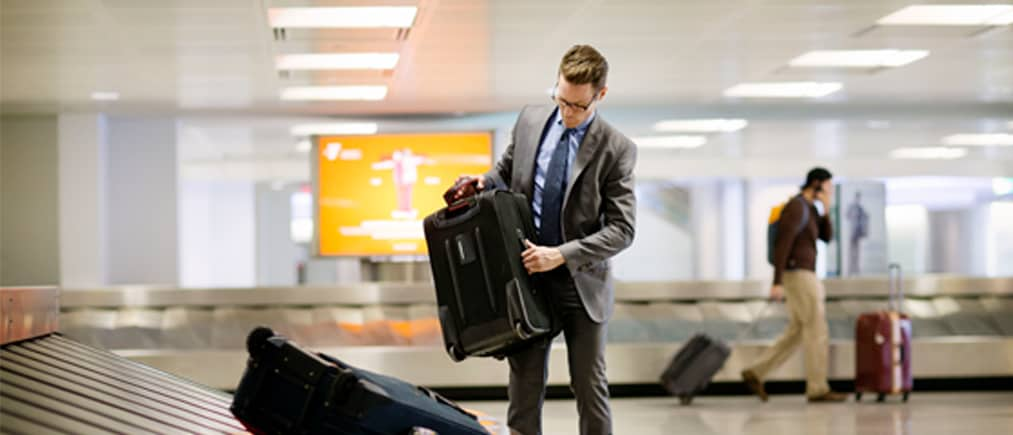
Published: November 14, 2023
Updated: December 19, 2023
Corporate travel management programs can be an effective way to manage business expenditures. Learn what these programs are and how they work.
If your organization has mushroomed from a mom-and-pop shop to a larger business with a traveling workforce or arranging business trips has become too much for your human resources or finance department to handle it may make sense to implement a corporate travel management program.
Here’s an overview of how corporate and small business travel management programs work, including how business credit cards come into play and how companies can benefit companies that prioritize both domestic and global travel.
What Is Corporate Travel Management?
Corporate travel management (CTM) is the framework that companies administer to successfully handle business trips and travel and entertainment (T&E) expenditures. CTM programs oversee, organize, and manage business travel end to end, including activities such as approving and booking flights and hotels, managing business credit card spending, ensuring employees comply with company travel policies, and recordkeeping.
Though these programs are commonly referred to as corporate travel management, even small organizations can benefit from a dedicated business travel management program.
How Does Corporate Travel Management Work?
As travel becomes more expensive, safety concerns heighten, employees become more mobile, and companies more global, the job of arranging everything from travel visas to restaurant reservations becomes more challenging. To effectively manage travel tasks, it’s often necessary to develop a CTM program. Depending on the company’s needs, this could mean one or more of:
- Hiring a corporate travel manager.
- Establishing an in-house corporate travel management team.
- Assigning business credit cards to employees who are traveling.
- Hiring an external corporate travel agency.
Smaller companies may be better off developing and hiring in-house business travel management teams to ensure that the workforce complies with company travel policies like spending caps and using approved vendors. Depending on the organization, a CTM program may grant employees the autonomy to self-book travel and accommodations that comply with company travel policies. Companies may even integrate automated travel management software systems that can be customized with budget restrictions and approved suppliers to better manage travel spending.
For larger corporations with major travel requirements, it can make sense to hire an external corporate travel agency that takes over all tasks related to business travel. As specialists in their field, they may be better able to negotiate the best rates while keeping employees’ comfort top of mind, handle global business travel management tasks, and take the time-consuming job of booking trips away from busy HR or finance departments. These professionals might implement corporate travel software that includes a booking tool, expense management tools, and reporting and analytics capabilities. These software tools may even use Global Distribution Systems (GDS) to pull up real-time data about hotel room availability, flight data, car rentals, and other pertinent travel information.
It may also make sense to hire an external corporate travel agency ad-hoc for large events like conferences or company-wide on-sites.
Benefits of Corporate Travel Management
The benefits of CTM programs are immeasurable for some companies because company travel is a vital part of doing business. Though video-conferencing calls have become routine, when it comes to building and nurturing relationships with clients and colleagues, converting prospects into customers, and networking with industry professionals, there’s no substitute for personal interaction. Following the travel slump due to the pandemic, business travel is expected to grow to $35 billion in 2025 .
Given the importance of business travel, companies may wish to consider the benefits of CTM programs, such as:
- Cost reduction: CTM agents, teams, and specialists should have greater travel expertise than the typical employee. They’re usually better fit to negotiate or find the best deals for flights, hotels, insurance, and other travel-related expenses.
- Time savings: Organizing a business trip takes a lot of time and effort, especially if your workforce travels often. CTM teams relieve your employees or finance department of that burden, allowing them to focus on their jobs.
- Policy enforcement: CTM professionals can help enforce corporate travel policies, enabling companies to monitor and reinforce compliance around hotel, car, and airfare spending caps, vendor stipulations, and more.
How Business Credit Cards Can Help Streamline Corporate Travel Management
Some companies manage business travel expenses by asking their team to report expenses with the promise of reimbursement. However, expense reporting can become difficult to manage as an organization grows, and the paperwork can become onerous.
For many companies, a more workable approach is to integrate corporate credit cards into their CTM programs. This can make it easier to monitor expenses and reconcile transactions. For example, business and corporate credit card programs sometimes come equipped with expense-tracking tools that can ensure spending visibility for employees and management. Stakeholders can monitor compliance with travel policies, validate expenses without paper receipts, and see what employees are spending. Automatic reconciliation can save time, while expenses can be integrated into a company’s accounting system, simplifying the often-tedious approval process. What’s more, card activity may be fed into the travel management software to further streamline the process.
Other benefits to integrating CTM programs with business credit cards for employees include:
- Closing loopholes for fake receipts or receipt manipulation.
- Increased security protection against theft, loss, and unforeseen incidents like accidents and mishandling, thanks to common business credit card benefits like travel insurance.
- Access to credit card perks, such as earning rewards, saving money on air travel and hotels, and gaining access to airport lounges.
The Takeaway
Corporate travel allows employees and executives to forge bonds with colleagues, turn business prospects into clients, and gain inspiration from new horizons. Corporate travel management (CTM) programs help to minimize the time-consuming aspects of business travel, like bookings and reporting paperwork, along with some of the other pain points of business travel. An effective CTM program can help organizations implement company travel policies, booking, track T&E expenditures, and successfully integrate business credit cards .
This article is intended for general informational purposes only and does not constitute legal advice or an opinion on any issue. It should not be regarded as comprehensive or a substitute for professional advice.
Trending Content
Browser not supported
This probably isn't the experience you were expecting. Internet Explorer isn't supported on Uber.com. Try switching to a different browser to view our site.
← Back to learning hub
The ultimate guide to corporate travel management
The days of businesses operating and growing within a small city radius are long gone. In today’s fast-paced and tech-savvy business world, companies have easy access to global talent and clientele.
As such, transporting stakeholders long distances is standard practice. Recent forecasts project that there will be more than 470 million domestic business trips taken in the US alone in 2024.
While corporate travel is a necessary part of operating a modern business, it can also be logistically difficult and costly to manage—especially as your business scales. This article will help cover what you need to know to improve your corporate travel management operations.
What is corporate travel management?
Corporate travel management is the process of coordinating, analyzing, and managing a company's business travel needs.
Effective corporate travel management is crucial for keeping business trips organized and efficient, ensuring that travel arrangements align with the company’s policies, helping to enhance the safety and comfort of travelers, and adhering to budgets.
What does a corporate travel manager do?
Craft and implement comprehensive corporate travel policies.
Corporate travel managers develop detailed travel policies that align with the company's unique goals and needs.
For example, a travel manager would establish policies for:
Booking procedures. Define processes for booking rides, flights, and hotels.
Travel class guidelines. Set standards for business or economy class based on distance, duration, or employee level.
Accommodation standards. Specify the type, budget, and class of accommodations allowed (for instance, hotels or home rentals).
Expense reporting and reimbursement. Set limits on daily allowances for meals and incidentals, and establish procedures for tracking and submitting travel expenses.
Technology use. Implement travel management software or apps to simplify travel arrangements, data analysis, and reporting.
Orchestrate seamless experiences
Corporate travel managers oversee the coordination and execution of business travel plans for employees. They either directly arrange all aspects of travel themselves, manage an internal team of travel coordinators, or work with third-party travel agents.
Today it’s also essential to adopt corporate travel apps , as they assist managers with streamlining travel plans across their organization. A corporate travel app helps with the following:
Automated expense tracking. Eliminates the need to save hard copies of receipts by automatically adding to the system the trips and meals to be expensed.
Centralized control from a dashboard. Provides complete visibility into travel policies, procedures, expenses, budgets, and plans.
Real-time reporting and tracking. Offers a comprehensive look into customized travel programs with real-time updates for travel, meals, incidentals, and more.
Simplified travel management. Includes flexible and customizable limits for booking rides, buying food, and processing payments (such as charging to a personal card for reimbursement or to a business card).
Control the budget for optimal financial outcomes
Travel managers navigate the line between providing comfortable travel experiences for employees and sticking to the business’s travel budget.
To do this, managers research cost-saving opportunities, identify the most cost-effective times to travel, and negotiate discounts with travel vendors.
A travel manager might, for instance, identify and book off-peak flights for a team attending an international conference. They could also track rideshare prices to find optimal travel times and book hotel rooms with corporate discounts.
Analyze data to inform future travel policies
Corporate travel managers are also responsible for monitoring travel data. Keeping a close eye on travel analytics helps with:
Tracking expenses. Examining corporate travel expenses reveals spending patterns and shows where the company can reduce costs.
Identifying travel patterns. Historical travel data helps managers find patterns and trends, which helps with forecasting future travel needs and preferences.
Benchmarking against industry standards. Travel managers compare their company’s travel spending and policies against industry benchmarks to better understand performance.
Analyzing supplier performance. Evaluating data about suppliers can uncover their reliability, service quality, and value.
Managers capture this data with feedback surveys from employees, travel industry reports, travel management software, and third-party travel platforms.
Prioritize duty of care for employee well-being
Corporate travel managers work closely with HR managers to develop duty-of-care protocols for their employees.
Duty of care in corporate travel includes:
Ensuring the health of employees. Maintaining the well-being and health of traveling employees and making sure they have access to necessary healthcare and support.
Providing for basic needs. Arranging for essential amenities like quality food and beverages, and comfortable accommodations.
Protecting employees. Keeping travelers away from situations where they may experience harassment, stress, or discrimination.
Collaborate with industry partners
Corporate travel managers’ duties don’t start and stop with coordinating and managing business travel. They’re also responsible for building relationships with top industry partners and vendors.
This includes establishing discount and comfort agreements with airlines, negotiating deals with hotel chains, and selecting the best rideshare apps.
They also work closely with internal teams and senior management to ensure that travel strategies and contracts align with overall business goals.
For travel policy setters or managers
Oversee your travel program with the flexible rules and streamlined reporting you need, with Uber for Business.
Challenges within corporate travel management
Successfully managing corporate travel requires so much more than simply booking plane tickets and hotel rooms for employees. Below are some of the top challenges corporate travel managers face.
Cost-benefit analysis
In corporate travel management, this involves quantifying all costs associated with travel and weighing them against the benefits, such as networking opportunities, employee development, client relationships, and successful sales.
Imagine a scenario where a company is considering sending an employee to an international conference that costs $3,000 in total. The corporate manager would need to research the potential benefits (such as networking, business development, and employee growth) of spending that $3,000 and determine if it’s worth it.
Cost-benefit analysis can also be nuanced. Consider this data point, for example: 48% of business travelers say their last work trip was too long. If an employee can accomplish what they need to in 2 days of travel and a manager books a trip for 4 days, it results in 2 extra days of employee time and corporate travel budget.
Cost-benefit analysis, in this instance, would involve analyzing past data, including post-travel feedback surveys, to understand how long employees need to travel to accomplish goals while optimizing the travel budget.
Traveler satisfaction
Research shows that 60% of employees say business travel positively affects their satisfaction with their job. And Slack’s 2023 “State of Work” report found that most employees say feeling happy and engaged at work is a key motivator. What’s more, when employees are happy and productive, businesses thrive, according to The Economist .
The tricky part for travel managers is accommodating employees’ diverse travel needs and preferences within a corporate (not a luxury vacay) budget.
To keep employees happy and productive, travel managers must understand what satisfies employees while they travel and then develop a plan to deliver a positive experience while working within a corporate budget.
Adapting to changing business needs
Shifts in business priorities, such as targeting new international markets or altering strategic partnerships, directly affect travel requirements.
A shift toward more in-person client meetings, for example, can increase travel frequency. Corporate travel managers must adapt policies and budgets to align with evolving business needs.
And efficient corporate travel management requires monitoring shifting political, economic, and health climates worldwide and being ready to respond and adapt. Travel needs can change in an instant, and corporate travel managers must remain adaptable to adjust travel strategies as necessary.
Environmental sustainability
A 2023 Deloitte study reported that climate concerns will likely limit corporate travel growth in the coming years. Deloitte found that “4 in 10 European companies and a third of US companies say they need to reduce travel per employee by more than 20% to meet their 2030 sustainability targets.”
This statistic highlights the growing pressure on corporate travel managers to devise travel strategies that meet the needs of a growing business while being efficient, cost-effective, and environmentally responsible.
4 tips for managing business travel
Now that we’ve discussed some of the job responsibilities and top challenges of corporate travel managers, let’s cover the best tips for managing business travel.
1. Establish clear communication channels
When employees don’t know your travel policies and procedures, it’s impossible for them to comply.
In other words, they might not know how much they can spend at a corporate dinner, whether they should take a taxi or use a rideshare app, or what safety and security policies they need to follow when traveling for business.
Consider establishing a clear communication channel where every employee can access critical travel information. This could be a dedicated travel portal or intranet page, regular email updates, or travel management software that provides real-time communication.
2. Conduct regular training sessions
Another way to fine-tune communication and increase awareness about travel policies is by conducting regular training sessions.
Create a live or digital training course that covers the following:
- Travel policies: Review company-specific travel guidelines and booking procedures.
- Safety measures: Explain all protocols and emergency procedures for travel. Draw special attention to areas people may be visiting that are undergoing political or civil unrest.
- Changes in procedures: Provide updates on any new or altered travel-related processes. This is especially important during health crises.
- Duty-of-care responsibilities: Educate on and provide clear definitions of the company’s commitment to traveler safety and well-being.
- Per diem amounts: Outline the daily allowances for expenses while traveling. Include a definition of what is and isn’t allowed. For example, is alcohol part of a per diem or excluded from corporate expenses?
- Expense reporting: Give instructions on how to accurately report and submit travel expenses.
3. Adopt travel technology
When you’re managing travel for multiple employees across different offices, it’s challenging to educate everyone, track expenses, and ensure compliance with travel policies. To organize and streamline everything, you may consider a travel management system (TMS).
A TMS is a comprehensive travel platform that helps companies book, track, and report travel activities. It typically also provides real-time data and analytics, helping you monitor travel spending and optimize your travel strategies.
4. Evaluate and update travel procedures and policies
Any changes in technology, the world economy, political climates, global health status, and industry have a profound effect on business travel.
As such, it’s essential to establish a process for continually evaluating and updating travel procedures and policies.
This could include:
- Reviewing policies to make sure they’re relevant, cost-efficient, effective, and safe
- Surveying your employees to see how happy they are with your travel policies
- Evaluating your TMS data to identify where you can optimize travel, innovate, and improve processes
Move your business forward with Uber for Business
In today’s fast-paced business world, getting corporate travel right is more important than ever. Adapting to changes quickly and embracing new technologies are key to staying ahead in managing business trips effectively.
You may also consider leveraging Uber for Business , a game changer in managing your company’s travel needs. It simplifies the entire process of corporate travel management with features like automated expense tracking and centralized control, making it easier to stick to policies and budgets.
With Uber for Business, you’re not simply organizing travel. You’re also saving time and money while giving your team a smoother, more efficient travel experience. Learn how to get started .
The platform
Get the best of Uber, for business—including improved cost controls and compliance.
Expense integrations
Save time with automatic expense reconciliation
Sustainability
Get clear climate metrics such as total low-emission trips and average CO₂ per mile.
We make your health and safety top priorities.
Employee benefits
All the advantages of Uber your employees already love, for business.
The dashboard
It all starts here - manage travel and meal programs with easy to set cost controls and more.
Business profiles
Help your employees connect with your company’s Uber for Business account.
Request rides and deliveries on behalf of customers.
Purchase Uber gift cards in bulk for simplified giving.
Uber Health
Reimagine the way patients access care.
Offer business-class perks with an Uber One company membership.
Cover the cost of rides and meals, and pay only when used.
By use case
Holiday gifting
Celebrate the holidays with vouchers and gift cards
Business travel
Oversee your travel program with the flexibility and reporting you need.
Employee commute
Set up a stress-free commute program for your employees.
Event transport
Get attendees to and from your next event.
Employee shuttles
Offer group transportation for daily commutes, cross-campus dashes, and more.
Courtesy rides
Request rides for customers and guests with ease, even if they don't have the Uber app.
Meal programs
One platform gives you the control to provide meals in multiple ways.
Recruit, retain, and reward your employees with Uber perks they want.
Corporate gifting
Exec management
Request rides and meals for leaders.
By industry
Elevate customer service with on-demand rides.
Improve health outcomes and the patient experience by enabling better access to care.
Hospitality
Delight your guests with rides and meals.
Financial services
Keep your employees moving and your clients happy.
Offer rides and meals to employees and constituents.
Customer support
Customer service
Get in touch with us or quickly find answers to top concerns.
Help Center
For admins and coordinators to browse tips and topics.
Product updates
Check out recent updates we’ve made across our platform.
Learning hub
Explore product education, case studies, and industry insights.
Customer stories
See how innovative companies work with us.
Get the latest news from Uber for Business.
- Contact sales
Service unavailable in your location
Unfortunately Booking.com for Business is currently not offering its services in your location
How Important Are Corporate Travel Managers?

If you’re an employee, business travel and work trips are enjoyable and productive.
However, if you're in charge of managing business travel for a whole company, you may find yourself on a rollercoaster ride.
So, what exactly do corporate travel managers do?
As the name implies, they manage travel needs for employees, customers, vendors, and business partners.
Their responsibilities include booking flights, arranging accommodations, and other miscellaneous costs and tasks.
Globalization has had a significant impact on the travel industry, and with that, the need to reduce costs has increased.
In corporate travel, company policies and procedures are created to reduce costs and streamline the business process for a more efficient, effective, and streamlined operation.
Let's take a look at how to establish an efficient corporate travel management system for your company.
Challenges in Corporate Travel Management
Business travel continues to be a challenge for many companies. Despite your best efforts, you may still have to invest a significant amount of time and effort just to complete what should be simple.
It doesn't have to take a lot of time or effort to complete such tasks. Let's explore some of the challenges corporate travel managers face.
1. Handling Large Amounts of Requests
This is a common challenge for small businesses . It's one of the responsibilities that are primarily the responsibility of the administration or finance department . If this isn't handled well, it can disrupt other duties and responsibilities they need to handle.
Requests are coming in from every corner of the business. An email comes from one teammate, and a Slack message comes from another.
In addition, you have employees who come to you in person, which further distracts you from what you are supposed to be doing.
Interactions between these two groups are problematic because of their disparate, inconsistent nature.
2. Tracking Approvals
A person in charge of administration or finance must track requests and ensure that travel has been authorized by the proper people. In most companies, a manager or team leader must approve the request, but some also need the CEO's signature.
More steps have been added to an already lengthy process. However, they are mandatory, so it's difficult to avoid them.
3. Keeping Spending in Check
Businesses must travel for growth, and it‘s considered essential to their success. However, the costs that come with it can be very burdensome.
Many employees love to take advantage of these opportunities, but this may mean that the business’s travel budget is spread thin. When this occurs, managers may decide not to approve reasonable requests.
4. Reducing Errors
Errors can be costly. The time that your finance team wastes fixing an employee's work is time that could have been spent on more productive activities… that is, if the mistakes can be fixed.
Lost receipts, incomplete expense claims, and incorrect types of expenses may distract your team from other responsibilities.
Best Practices for Corporate Travel Management
1. choose a smart booking tool.
It's not surprising that businesses worldwide started booking travel via consumer sites after the advent of online booking sites.
Without booking tools , there’s a lack of oversight from the CFO, and the finance departments are tasked with micromanaging travel spending for the entire company in a controlling manner.
Transformation is impossible without technology. To manage travel today, choose a tool that’s built on trust, transparency, and simplicity (don't forget).
2. Assure 24/7 Travel Support
It’s difficult to provide travel support 24 hours a day . It's easy to get overwhelmed when cancellations, changes, and other requests consume your workday and flood into your night and weekend.
When you're unable to assist, travellers get stuck waiting for fixes that ultimately cost your business money and time. An ideal solution would be to partner with a company that’s able to provide 24/7 travel support so that your role as an office manager or travel manager is relieved.
3. Create Policies and Approval Workflows
Automating your business travel policy offers three key benefits in your travel management process. The first benefit is that you’re able to maintain compliance with your travel policies on a 24-hour basis.
Since they no longer have to book all trips, the administration team saves time. Travellers enjoy the convenience of booking their own trips.
You should consider putting in place a more complex policy for departments or members of your team with special travel needs. This allows the company to adopt a flexible policy instead of one that applies to the entire company.
It’s possible to set up automated travel policies so that they are either as strict or as lenient as you desire. You want to have a simple process in place in case a traveller attempts to book a trip that's outside the policy.
For an admin who’s regularly approving trips, having a dashboard that shows you everything pending approval can be extremely helpful.
They’ll always have an updated record of trips in progress, and they won't ever have to dig through their email account.
4. Schedule & Use Travel Spend Data
Admins aren't the only ones who benefit from effective travel management. Collaboration between your finance and operations teams is key when it comes to managing expenses . If you want travel expenses reported correctly, you'll want detailed information too.
You can generate smart reports that will help the finance team identify trends, leaks, and opportunities for budget optimization by using cost centres and labels and by making sure that all your trips are included in the booking tool’s reporting software.
To Wrap-It Up
It’s safe to say that corporate travel managers are critical to ensuring that your company remains safe and secure while travelling, while also looking for ways to reduce any costs relating to business travel.
That’s why travel managers love Locomote, we give them everything they need to look like superheroes within their business while giving them more time back in the day to support the company in other areas.
See for yourself today with a one on one demo of our platform.
Sign up to get all of the latest updates and news.
Travel Risk Management, Then and Now

5 Reasons Why You Need Business Travel Insurance

More relative insights and news.

5 Major Trends Affecting the Corporate Travel Industry

5 Tips to Help Reduce Your Travel Spend

6 Tips on How To Master Corporate Travel Management
The complete guide to corporate travel management
Aug 2, 2023

Corporate travel management can be a complex, expensive undertaking. But by planning ahead, you can reduce your business travel costs while giving employees a comfortable, safe, and reliable experience.
In this article, you’ll get all the advice you need to ensure your corporate travel management offering is in the best possible shape.
What is corporate travel management ?
With the rise of global business comes the need for employees to travel. And managing this travel (along with the expenses that go with it) has made having corporate business travel management software, and processes in place crucial.
Under the umbrella of corporate travel management is everything related to the management of business-related trips. And there’s plenty to consider:
- Building and maintaining travel policies (they should be sustainable travel policies , too).
- Ensuring compliance with your policies.
- Setting travel budgets and tracking spending.
- Trialling corporate travel management software .
- Having clear expense management guidelines and processes.
- Booking flights and accommodation.
- Arranging ground travel (many companies overlook this!).
Note: You’ll sometimes see corporate travel management shortened to CTM.
The many challenges of corporate travel management
Business travel management can throw many challenges your way.
For upper management, the challenges revolve around keeping spending within budget, gaining control over how employees travel, and knowing that every trip makes efficient use of time. But management expectations also need to align with the needs of employees.
You must ensure your employees have safe, reliable, and comfortable transport — whether in the air or on the ground. Many employees are also conscious of their environmental impact when travelling — but you should already factor sustainability into the equation as part of your business goals.
The period following a trip is when companies don’t realise that their employees are losing hours of valuable time. And it all comes down to expenses.
A smooth expensing process
The thinking often goes that filling out expense reports is necessary — but that’s all changed.
Collecting receipts, holding onto them (how many taxi receipts have you misplaced?), and typing up all the details into an expense form has become a thing of the past. This is great news because your team can focus on more valuable tasks knowing they still get their money back.
That’s if they even have to spend their own money at all. Let us explain. 👇
Take Bolt Business as an example. By setting up your account, your employees will see your company as a payment method in their Bolt app .
That way, they can charge business trips to the company without using their own money — and they can only spend as much as your pre-set budget allows.
That means no overspending and no expense reports — corporate ground travel has never been easier to manage.
Ensuring employee compliance
Regarding business travel, employee compliance ultimately depends on whether your team follows your corporate travel policy. Making sure this happens will benefit the company as a whole in several ways:
- Maintain (or even improve) your company’s reputation.
- Avoid situations where employees overspend.
- Removes the need for micromanagement.
- Keeps travel-related risks to a minimum.
- Keeps all data safe and secure.
The best corporate management software ensures employees comply with your travel policies by preventing actions that don’t fit the policy. But your efforts to increase employee compliance shouldn’t come at the expense of flexibility.
Accepting the importance of flexibility
For some businesses, giving employees flexibility when they travel can be a hard point to face. It’s worth accepting, though, because having an element of flexibility will make travelling for work far more comfortable.
Meetings often overrun, and you can’t plan for unexpected chances to network. In these moments, your employees need confidence they can easily return to their hotel or next engagement in comfort.
Giving your team various travel options is essential — cars aren’t the only way to travel around a city. In many cases, an electric scooter or e-bike is far more convenient.
As crucial as travel policies are, they shouldn’t hinder your employees’ success on their business trips.
Keeping employees safe
Following a global pandemic, the attention given to corporate travel risk management is at an all-time high. As an employer, you should keep your employees safe when they travel for work.
How safe they feel comes down to how you’re managing your corporate travel — including the software, services, or apps you choose to use. Always keep safety top of mind when comparing corporate travel services.
Overlooking ground travel
When an employee heads away for business, they might need a flight (although a multimodal approach would be more sustainable) and often need accommodation too. While these are both highly important, they shouldn’t overshadow ground travel arrangements.
Arriving in an unfamiliar city or country can be stressful and nerve-wracking — especially for first-time business travellers. And knowing that transport to meetings, their hotel, or the airport is all sorted removes some anxieties.
An even better option is to invest in a corporate travel management app which allows employees to easily book transport themselves at the company’s expense (such as Bolt Business ).

Finding the right corporate travel management tools
To help lighten the load of all these challenges, many companies use corporate travel management solutions which automate much of the process. Depending on the size of your company, you could also see the benefit of hiring a corporate travel manager .
The duties of Corporate Travel Managers
When a business traveller has a question or concern regarding a business trip, they can turn to the Corporate Travel Manager . This person has to handle everything related to business travel, such as:
- Building the company’s travel policies.
- Ensuring compliance with travel policies.
- Booking transport.
- Arranging accommodation.
- Reporting on business travel expenditure.
Anyone in the Corporate Travel Manager position will also be working with corporate travel management software for booking transport and managing expenses.
Worth noting: The average Corporate Travel Manager in the EU expects a base salary of around €70,000 — far less than their counterparts in North America ( €109,300) .

How corporate travel management software can benefit your business
You’ve been introduced to the idea of corporate travel management software, but let’s find out how it can help your company.
There are 3 essential things that any corporate travel management tool should take care of:
- Managing travel expenses.
- Ensuring employee safety.
- Streamlining the booking process.
With these areas covered, a corporate travel management system will help your business save money, reduce travel-related stress, and maintain a professional image.
Travel within budget
By developing travel policies and setting guidelines for travel expenses, companies can reduce costs and ensure that employees follow best practices regarding business travel. This can include everything from booking flights in advance to staying in budget-friendly accommodation.
Employee safety and well-being
You should always provide your employees with travel insurance and access to medical services when they travel for work. While taking these precautions has always been essential, your corporate travel management software should allow employees to share their location as they move.
Track and report on travel
Leveraging technology allows you to manage travel more efficiently, automate expenses, ensure compliance, and improve employee satisfaction. On top of that, you’ll also be able to monitor your team’s travel data and analytics from one location. With easily accessible data, you’ll find identifying opportunities to control costs easier.
Best corporate travel management software
A lengthy list of corporate travel management solutions is out there, making finding the right one for your business a tough job. But if you follow the guidance above, your search becomes much easier, and you’ll overcome all the everyday challenges of corporate travel management . These are 5 of the best tools:
- Bolt Business .
- SAP Concur.
- Zoho Expense.
You can compare these corporate travel management companies in our article about Travel and Expense Management Software .
Don’t overlook corporate ground travel
Your company’s corporate travel management system needs to make life easier for your business travellers while making management easier for your team. You want to avoid a travel policy that fails your employees . Ground travel has a role to play in every business trip — domestic and international — so it’s essential that you don’t overlook it.
Partnering with a corporate ground travel company will save you money and ensure the safety and well-being of your employees — which is where Bolt Business comes in.
Get it all with Bolt Business
Bolt Business is a corporate travel management tool that gives your team a comfortable, safe, and reliable way to travel for work across Europe and Africa. And as the admin, you’ll be able to set travel rules, track orders, and pay for all travel from a single dashboard .
When you add employees to your account, they’ll see your company as a payment method in their Bolt app. This allows them to charge work rides straight to the company — as long as the journey meets the travel policy and spending limit.
Sign up with Bolt Business today to take corporate travel management within your company up a gear.

Recent posts

Bolt Market users prevented 80 tonnes of food waste in 2023
Apr 23, 2024
Bolt’s mission is to make cities for people, not cars. We started with ride-hailing to make getting around easier. But over time, we’ve realised that to improve city living, we […]

An open letter to the entire food delivery industry
Apr 8, 2024
Dear competitors, You must be wondering why we’ve gathered you here today. Before we answer, we’d like to draw your attention to this GIF of a chicken holding its head still […]

Bolt Business records a 70% year-on-year rise in new signups
Mar 7, 2024
The number of new companies that created a Bolt Business account in 2023 grew by 70% year-on-year! This growth puts Bolt Business on course to becoming a B2B unicorn within […]
Get a ride in 500+ cities across the world
Download app
Earn extra money driving your car
Sign up to drive
Basics Of Corporate Travel Management
Home » B2B » Basics Of Corporate Travel Management
Corporate travel management can be a nightmare for admins and managers, as one has to look after several factors that may or may not be under one’s control. Flight delays, natural calamities, political disturbances, an outbreak of an epidemic, and local unrest are only a few aspects that can devastate the very purpose of business travel.
Without a well-established framework of corporate travel management, companies can find it difficult to organize and handle business trips and related expenditures. With a dedicated TMC and custom travel management strategy, travel managers and administrators can remain in control of business travel end to end. With efficient help at disposal, managers can ensure that employees are following the travel policy and remain safe during their travel.
What is corporate travel meaning?
Corporate travel is the term used to describe the journeys made by a corporate employee in search of new prospects, and opportunities, or to render a service. There are two kinds of business trips: managed and unmanaged. Unmanaged corporate travel includes organizing the trips internally in the absence of a reliable reservation system. Managed corporate travel entails contracting out business travel to TMCs with cutting-edge booking systems.
Key benefits of corporate travel for companies
- Helps in business travel expansion and development
- Better client support and customer engagement
- Assist in collaboration and team building
- Business trips helps in expanding the corporate network
- Enhances the brand image
Key benefits of corporate travel for employees
- Helps in professional development of the employee
- Assist in relationship building and networking
- Travel results in skill enhancement of the employee
- Increased job satisfaction and ensures work life balance
- Helps in cultural richness and expose to new markets
Benefits of the corporate travel program
The key benefits of using the right corporate travel management company and program are:
- Reduces the complexity of corporate tours
- It saves time and money of the corporate
- It makes the business trip more effective as employees can focus on their tasks more sharply
Corporate travel management challenges and their solutions
1. attending to a flood of requests.
Major organizations outsource the job to a dedicated corporate travel agency with a corporate manager within the business. However, small businesses overlook the importance of the former. They assign the responsibility of monitoring business travel to someone in the office and end up spending more of their time and money. Further, corporate travel management is a routine activity in organizations relying on the sales department to get business worldwide. In such cases, travel managers have to deal with various employee requests pouring in different formats. The requests may be through simple telephonic conversations, text messages, or emails. This unorganized method can lead to stressing the person at job and making expensive bookings. The simple way to eliminate this problem is to hire a corporate travel agency.
2. Approval tracking

Most companies have a system in place to track approvals for travel requests. These approvals are as per the employee levels. The department head is usually the final authority to approve someone’s travel request. A CEO’s approval may be mandatory for a few companies. Lack of adherence to the approval process can cause chaos and affect the itineraries of employees and the company’s business. An efficient corporate travel management company can use platforms like Paxes to help companies create a proper path for requests and approvals.
3. Cost control
According to several reports, corporate travel accounts for the largest portion of business expenditure. Corporate trips are crucial for business growth but constant canceling and booking can cause a significant strain on the company’s bottom line. Further, booking expensive flights and hotels when cheap ones are available with the same facilities can lead to a dent in the monetary management. Therefore, to avoid such situations one can opt for a reliable TMC equipped advanced booking platform. These corporate travel management platforms help to find the best packages even at the peak time.
4. Shifting responsibilities
A company can achieve remarkable travel planning and management resilience by allowing employees to plan their journeys. It makes employees feel more responsible and optimizes travel expenses to reduce costs. The decision will also reduce the additional burden of travel management on the office staff. Entrusting intermarries to employees who are going to travel is more practical than asking someone in the office who has no exposure to business travel. Established corporate travel management companies provide advanced AI-backed solutions to make this a reality.
5. Simplifying corporate travel
A restraining travel process can take away the joy of traveling. It can defeat the very purpose of setting business trips when employees have to go through a complex procedure. The following actions can create a more flexible environment to inspire employees to undertake business travels without hassles.
- Reduce the number of perplexing rules
- Reduce unnecessary approvals and emails
- Eliminate the need to fill out forms manually
- Improve clarity of the process
Emerging trends in corporate travel
- Today, bleisure travel is more common as it increase the overall satisfaction of the employee
- Remote work has become a world wide accepted culture
- Governments and organizations are focusing on sustainable trips
- Technological advancements have made business travel simple and efficient
- To enhance satisfaction, organizations provide personalized trips
An intuitive corporate travel management company equipped with advanced booking platforms for supporting the travel booking process is the right solution. These platforms provide exceptional booking solutions with real-time flight, hotel, and other charges. Further, TMCs come up with innovative answers to all the complicated corporate travel issues.
Must Read: Top Benefits Of Corporate Travel Management Companies
Corporate Travel FAQs
What is the purpose of corporate travel.
Corporate travels are made to get exposure to new opportunities and services. It also helps in associating foundations with new and existing relationships.
What are the types of corporate travel programs?
Unmanaged and managed corporate travel are the two categories. Unmanaged corporate travel comprises organizing the travels internally in the absence of a reliable reservation system. Managed trips are outsourced to TMCs with pre-booking systems.
What are the challenges of a corporate travel program?
Answering queries of the employees, tracking the approval process, being cost-effective, and simplifying business travel.
How can the cost control challenge in a corporate travel program be solved?
This can be done by hiring a dependable travel management company which has advanced booking systems.
How can corporate travel be simplified?
Decrease the number of rules which can lead to confusion in the future, eliminate the number of steps in the approval process, avoid filling forms manually, and explain the process thoroughly.
Pratyush is a traveling enthusiast who always looks for innovations in business travel management. He has 5 years of experience writing content on corporate travel management and working closely with expert business travel facilitators.
Leave a Reply
Related posts.

Corporate Traveler Profile: How Does It Help TMCs And Travelers
In this era, where everything is about and around technology, the travel industry has found a way to leverage technology in the best way possible. Large travel management companies (TMCs) generally use a global distribution Read more…

All You Need To Know About Business Travel Meal Expenses
When planning to send an employee on a business-oriented trip or to an event for company exposure, one overlooked aspect of travel planning is business travel meal expenses. Yes, it is quite easy to forget Read more…

Travel And Expense Policy: Objectives Of Corporate T&E Policy
Among an organization’s most prominent controllable costs, business travel expense is the second largest after salaries. It impacts the organization’s bottom-line irrespective of the company’s size. While ‘travel and expense’ are unavoidable because of their Read more…
Let's get started!

Thanks for submitting your details.
We'll get back to you shortly.

What Are The Benefits Of A Corporate Travel Management Company?

7 Benefits of Using a Corporate Travel Management Company are:
- Access to a Dedicated Support Team
- Cost Saving Strategies
- Assistance with Risk Management
- Access to Technology and Tools
- Enhanced Reporting
- Travel Policy Creation and Integration
- Time Savings for Travel Managers and Traveler
1. Access to a Dedicated Support Team
Benefits for the Travel Manager
A corporate travel management company (TMC) should offer its clients a dedicated support team. As a travel manager, you are responsible for creating and maintaining an evolving, complex program. Working with a dedicated support team to help manage your program has many benefits.
First, you can lean on a team of experts. Whether you are creating a new travel program or you are looking to improve your current one, a TMC should be able to make recommendations to help you meet your goals.
At Christopherson Business Travel (Christopherson), our travel management experts average more than 25 years of experience in business travel. We have helped hundreds of organizations overcome the challenges of business travel and achieve a variety of goals. Not only do we recommend adjustments our clients can make to their programs, but we also specifically point out how we can help them get there.
Another benefit of having a dedicated support team is that travel managers can rely on experts to provide best practices, industry updates, and seasoned expertise. When a business travel program is outdated, corporate travelers become frustrated. In a dynamic industry that changes rapidly, it’s important for travel managers to stay informed about current and emerging trends.
Benefits for the Business Traveler
Depending on your booking and service needs, your travelers might have access to a dedicated travel advisor team, a certified online support team, or a combination of the two. By partnering with a corporate travel management company, your business travelers can feel confident knowing they always have trusted experts to turn to 24/7, 365 days a year.
Having a dedicated support team to assist with travel challenges (like delayed flights or overbooked hotels) significantly improves the overall traveler experience. A TMC also considers traveler preferences and loyalty information when helping them book travel within policy. At Christopherson, your travelers can access a small, dedicated team of travel advisors, so they always know who to contact for support.

Some TMCs offer support via a call center, which can be frustrating. Call center agents won’t be familiar with your travel preferences or policies, and travelers often don’t receive the level of customer service they deserve. With a dedicated team, you’ll have personalized service and relationships you can count on.
Another benefit of having a dedicated support team is providing VIP services for your executive travelers. At Christopherson, priority response time, requesting special accommodations, and frequent traveler enrollment assistance are just a few of the VIP services we provide.
2. Cost Saving Strategies
Corporate travel management companies help businesses save money by securing the lowest possible rates on travel. Consider the following hypothetical scenario: You reach out to a large hotel chain to negotiate a corporate rate for your business. You attempt to use your predicted number of reservations of 150 nights as leverage for a lower rate. The hotel is able to offer you a discounted rate of $160 a night.
Now imagine that your corporate travel management company reaches out to the same hotel chain. Instead of 150 nights, your TMC is leveraging the 15,000 nights they anticipate booking among 75 different accounts. It probably comes as no surprise that the hotel is able to offer your TMC an even lower rate of $140 a night.
This example illustrates how working with a TMC increases your buying power and, ultimately, saves you money. Also, by consolidating your hotel spend, a TMC can continue to negotiate lower rates on your behalf year after year.
When it comes to your travel policy, corporate travel management companies make compliance effortless through integrated technology. You can find more details about this below, but one of the reasons travel policies exist is to help manage costs. If your travelers are booking outside of your policy, chances are they are paying more than you would like because they’re not accessing your negotiated rates.
Next, let’s consider unused airline ticket funds. It’s inevitable that business travelers will have to cancel trips due to scheduling changes, which can potentially leave money on the table. Nearly 10% of all business travel airline tickets go unused. As a travel manager, how do you ensure these unused ticket funds aren’t impacting your bottom line? A TMC can monitor these funds, helping ensure they are used before they expire.
Christopherson’s AirBank tool is our solution to managing unused airline tickets. AirBank captures those funds in a centralized database and then prompts travelers to reuse them during their next booking. AirBank’s transparency encourages active participation in the reuse of the ticket. This helps prevent loss of funds, cut costs, and eliminate waste. Managers can also access real-time status updates and reports on those unused tickets and the subsequent available funds.
Lastly, when partnering with a corporate travel management company that charges fair and transparent fees, travel managers are able to more accurately budget for their travel program costs. Christopherson’s all-inclusive pricing structure includes all account management, technology, integrated reporting systems, and tools. Some TMCs operate on an “a la carte” model which can quickly become costly and unpredictable making it more difficult to budget.
By negotiating lower rates, travelers are often able to choose from higher-end hotels than they would be offered without the purchasing power of a TMC. This improves their overall travel experience and makes for happy travelers.
Unless a tool or system like AirBank is in place, it is easy for travelers to forget about the unused airline tickets they have at their disposal. By providing travelers with money-saving tools like AirBank, travelers can easily cash in on those tickets whether booking online or with an advisor.
3. Assistance with Risk Management
Businesses have a legal and moral responsibility to keep their travelers safe from threats while they are on the road. Threats can range from something as serious as an outbreak of an infectious disease to losing a passport. Regardless of the circumstance, it’s important that travel managers are aware of threats as soon as possible and have a process in place to keep their travelers safe.
Assistance with risk management is a huge benefit of working with a corporate travel management company. In a recent study , only half of the travel managers surveyed felt confident that they could locate their travelers within two hours of an emergency. When working with a TMC, travel managers often have access to risk management tools that make them more efficient and effective in times of crisis.

For example, Christopherson’s SecurityLogic tool (available within our AirPortal platform) provides travel managers real-time information regarding which of their team members are currently traveling and where those travelers are. SecurityLogic allows you to quickly see if your travelers are in or will be in an affected area.
SecurityLogic’s alerts inform travel managers of events that could impact employee travel or compromise their safety, and the Safety Check feature can be used to verify traveler safety.

When businesses utilize the full range of corporate travel benefits tools like SecurityLogic provide, travelers feel safe and secure while on the road. When traveling, staying up-to-date on breaking news can be a challenge. Travelers will find comfort in knowing that if they are in or traveling to a potentially dangerous area, their employer is proactively warning them of any threats and has a plan in place to keep them safe.
4. Access to Technology and Tools
Without updated technology, travel managers are left to manage their travel programs manually using spreadsheets and emails, which can be time-intensive. Integrating best-in-class technology into your travel program is a sure way to save you time and money.
Corporate travel management partners streamline your processes for requesting travel, approving travel plans, and expense reporting. Christopherson’s AirPortal software platform has your negotiated vendor contracts, travel policy, and travel approval system built-in, ensuring compliant travel booking. All reservations filter into your custom reports and align with your managed travel program. AirPortal can be integrated with valuable benchmarking tools, preferred booking tools, and your HR feed. These technologies make your program efficient and integrated.

AirPortal 360 Mobile, the mobile version of our travel manager dashboard, is the first and only comprehensive mobile app for travel managers that allows you to manage your entire travel program from the palm of your hand. With AirPortal 360 Mobile, travel managers can locate travelers in real-time, verify their safety, view itineraries, monitor travel plans, enroll/deactivate travelers, and manage traveler profiles from anywhere.
When working with a corporate travel management partner like Christopherson, you will also have access to tools like Virtual Pay. Virtual Pay eliminates faxing credit card information to hotels by creating single-use credit cards for each hotel booking. The unique card is then sent to the hotel for booking payment. This process helps eliminate traveler reimbursements, improve billing accuracy, and consolidate hotel spend.
With access to a robust set of tools and technology, travelers are more organized, efficient, and satisfied with their travel program. Booking compliant travel, reimbursing expenses, and locating travel plans becomes a breeze. Traveler profiles ensure that loyalty programs and preferences are always considered at the time of booking.
5. Enhanced Reporting
Arguably the most important aspect of any successful program is the ability to access, aggregate, and visualize the data to inform decisions. Some corporate travel management companies offer reporting tools that allow you to view your entire travel program in one location.
Domo, AirPortal’s integrated business intelligence and data visualization program, delivers real-time insights that help you take action and manage a smarter travel program. By aligning metrics that matter to you in one centralized location, you can start to visualize the story your data creates.
With complete visibility into your travel program, you can quickly identify the departments that spend the most on travel or which hotels are booked the most. This allows you to draw meaningful conclusions that help you improve processes and save money.
With Christopherson’s ValueLogic technology, travel managers can also assess the ROI of our partnership. Customizable reports show exactly how and where we’re saving our clients’ money.
While travelers don’t necessarily need access to the full range of reporting options that travel managers need, data from these reports is essential to your travelers’ ability to book within policy, reconcile credit cards, monitor unused tickets, and identify when their profile information needs to be updated. Good data also makes life easier for travelers in the long run.
6. Helps Create and Maintain Your Travel Policy
When creating or updating a policy, it’s helpful to have experts consult with you on current best practices in your industry. A travel policy should be a living concept and evolve with the industry. Corporate travel management companies help ensure your travel policy is up to date and integrated throughout your booking tools, benchmarking tools, and HR feed.
Keeping your travel policy current is a great way to keep your travelers happy. And with policy integration, travelers can be confident their bookings are always compliant.
7. Saves Travel Managers and Travelers Time
Streamlined and integrated travel programs save travel managers time by keeping them organized and efficient. Whether you’re managing the ins and outs of a large global travel program or have a small team of road warriors, working with a TMC makes your day-to-day efforts easier by helping you implement the processes and plans that will help you reach your goals and support your travelers.
Centralized, integrated travel programs save travelers time by simplifying the booking process, making it easy to get travel approved, providing the resources and service needed to make their actual trip a breeze. Gone are the days of frantic inbox searches for flight plans, not knowing whether your booking falls within policy or where your frequent flyer number is. Travelers can spend time actually doing what they were hired to do rather than wasting time weighing the costs of different flight options or figuring out logistics of an upcoming trip. A travel management company has the expertise they can rely on.

Connect with our team of experienced travel experts to learn how Christopherson can help your business travel with ease.
There's more to learn.
We’ve curated some articles to keep you updated on all things Christopherson Business Travel.


What Are The Perks Of Consulting A Property Management Provider In Vancouver?
6 hours ago

Styling Tips For Plus Size Women: Embracing Your Curves With Confidence

5 Advantages Of Design Systems For Designers, Developers, Product Managers, And Their Teams

Getting Into a Flight School in Florida: What Makes You a Better Airline Pilot?

Road Trip Safety: How To Ensure Safe Driving During Nighttime

Legal Options For Victims Of Catastrophic Injuries
2 weeks ago

Navigating The Heartache And Legalities: The Path Through Wrongful Death Cases

How To Be A Good Second Hand Seller?

Establishing Your Brand: 6 Critical Tips For Leaders
Sorry, but nothing matched your search " ". Please try again with some different keywords.
Top Stories For You
Crazy Facts About The Largest Cruise Worth £2billion, 5 Times The Size Of Titanic!

What Are The Knott’s Berry Farm Hours?

The Pros And Cons Of Choosing An RV With A Bathroom

Preparing for Winter, Wildlife, and Unavoidable Collisions

4 Largest Shopping Mall Near Legoland Malaysia

10 Tips For A Safe Road Trip

Unlocking The Magic: Your Ultimate Guide To Disneyland Tickets!

Top 5 Grenada Passport Benefits
Maximising efficiency and savings: the importance of corporate travel management.
By Abdul Aziz mondol | 02nd March, 2024 | 57 Views

Corporate travel has become integral to conducting business globally in today’s fast-paced business world. However, managing corporate travel can be complex and costly if not properly organized and controlled.
This is where corporate travel management comes into play. In this comprehensive guide, we will delve deeper into the benefits of corporate travel management and how it can significantly impact a company’s bottom line, offering a more profound understanding of its multifaceted advantages.
Cost Savings
Negotiating better rates.

Corporate travel managers leverage their extensive contacts and industry relationships to negotiate preferential rates with airlines, hotels, and other service providers. Your company can unlock significant cost savings by consolidating bookings through these negotiated contracts. This strategic approach ensures that your travel expenses remain competitive and well within your budgetary constraints.
Read Also: How ITILITE travel management software helps in business travel bookings
Policy Enforcement
An integral aspect of corporate travel management is enforcing comprehensive travel policies. These policies outline guidelines and restrictions for booking flights, accommodations, transportation, and other travel-related expenses.
Adhering to these policies encourages employees to make fiscally responsible decisions. Such diligence is paramount in preventing unnecessary expenditures and maintaining cost control throughout your organization.
Expense Tracking
Modern travel management software empowers companies to track and analyze travel-related expenses. This level of visibility allows organizations to identify opportunities for cost optimization.
Businesses can make informed decisions regarding potential cost-cutting measures by scrutinizing travel expenses. These measures include reducing non-essential upgrades or opting for more economical modes of transportation.
II. Streamlined Booking Process
Centralized booking.
A centralized booking system simplifies the entire travel booking process for employees. Access to a single platform allows them to seamlessly book flights, accommodations, rental cars, and other travel services. This eliminates the need for employees to scour multiple websites for deals and ensures strict adherence to your company’s travel policies. The result is a more efficient and hassle-free booking experience.
24/7 Support
Many corporate travel management companies offer around-the-clock customer support for travelers. This means that employees can receive assistance and support, including rebooking flights in case of delays or cancellations, at any time of the day or night. Such dedicated support minimizes disruptions and reduces stress levels for employees while on the road.
Mobile Accessibility
Modern corporate travel management solutions often extend their services through mobile applications. These apps grant employees easy access to their travel itineraries, real-time updates, and the ability to make changes while moving. This level of convenience enhances the overall travel experience and boosts employee productivity during their travels.
Iii. Enhanced Traveler Safety And Compliance
Risk management.

Corporate travel management extends beyond cost considerations. It also encompasses the critical aspect of traveler safety. Travel management companies provide tools and resources to assess and mitigate travel risks.
These tools may include monitoring travel advisories, offering safety information, and assisting during emergencies. Employees can embark on their journeys with a heightened sense of security by prioritizing traveler safety.
Travel Policy Compliance
Corporate travel management systems are adept at enforcing compliance with your organization’s travel policies. This not only aids in cost control but also ensures that employees adhere to safety guidelines.
For instance, policies can mandate the use of approved hotels in safe neighborhoods or require the purchase of travel insurance for certain destinations. This unwavering adherence to established protocols minimizes potential risks and enhances overall travel safety.
Iv. Data And Reporting
Expense visibility.
Corporate travel management software generates comprehensive reports highlighting your company’s travel expenses. This invaluable data allows decision-makers to understand where your organization’s financial resources are allocated. Armed with this information, you can make informed decisions regarding cost-cutting strategies and the allocation of your travel budget.
Performance Metrics
Tracking key performance metrics is another advantage of corporate travel management. By monitoring traveler satisfaction, on-time arrivals, and adherence to travel policies, you gain a deeper understanding of the effectiveness of your corporate travel program. Identifying areas needing improvement becomes straightforward, allowing for data-driven adjustments and enhancements.
Vendor Performance
You can assess travel vendors’ and suppliers’ performance Through meticulous data analysis. This data-driven evaluation can be instrumental in negotiating better contracts and ensuring that your company maximizes its value from its travel partnerships. It lets you identify and cultivate strong relationships with the most reliable and cost-effective vendors.
V. Increased Employee Satisfaction

Ensuring your employees are content and comfortable during business travels is integral to maintaining high employee morale and productivity. Corporate travel management can play a pivotal role in enhancing employee satisfaction through various means:
Reduced Stress
Traveling for business can be inherently stressful. From navigating airports to dealing with unforeseen flight delays, employees often face many challenges while on the road. However, corporate travel management aims to mitigate these stressors. Employees can quickly and easily arrange their trips by providing a centralized booking platform, eliminating the need for exhaustive online searches.
Convenience And Support
Offering employees convenience and unwavering support throughout their journeys demonstrates a commitment to their well-being. Corporate travel management solutions, including mobile apps, provide employees with easy access to their travel itineraries and real-time updates at their fingertips.
This level of convenience empowers employees to make adjustments or seek assistance swiftly, further reducing stress and enhancing their overall travel experience. Knowing they have dedicated support 24/7 provides peace of mind, creating a sense of security they can rely on in any travel-related situation.
Read Also: Get Flat 2.5% of cashback on business Travel spends through ITILITE Corporate cards.
Personalization
Some corporate travel management solutions offer a degree of personalization in travel preferences. This can include options such as seating preferences or enrollment in loyalty programs. These personal touches make employees feel valued and appreciated, enhancing their travel experience .
Corporate travel management is not merely about booking flights and accommodations; it is a strategic approach that can yield substantial benefits for your organization. Companies can maximize the value of their corporate travel program by focusing on cost savings, streamlined processes, traveler safety, data-driven decisions, and employee satisfaction.
Corporate travel management is an investment that pays off in more ways than one, ensuring that your business remains on the right track and ahead of the competition while keeping your employees content and productive.
- Amazing Tech To Make Running Your Business Easier
- 5 Tips To Boost Business Performance In Today’s Digital Era
- 2022 Is The Year Of Corporate Sustainability – An Earth-First Business Culture Guarantees Success
Like What You’re Reading?
Sign up for tips & tricks newsletter for expert advice to get the most out of your technology, share this article:.
Abdul Aziz mondol
Abdul aziz mondol is a professional blogger who is having a colossal interest in writing blogs and other jones of calligraphies. in terms of his professional commitments, he loves to share content related to business, finance, technology, and the gaming niche., leave a reply, your email address will not be published.required fields are marked*.
Save my name, email, and website in this browser for the next time I comment.
Leave a Reply Cancel reply
Your email address will not be published. Required fields are marked *
Latest News

The Benefits Of Corporate Partnerships For Startups
12 months ago

Coronavirus Update (Live)
4 years ago

Top 5 Telemedicine Apps

Laws for Healthcare Apps

6 Common Hiking Mistakes For Beginners And How To Avoid Them

4 Ways To Become A U.S. Citizen

Speed Boat Tours In Miami: A Credible Rental Company
Rslonline newsletter.
- Advertise Us
- Submit News
- Privacy Policy
- Terms & Conditions
- Write For Us
- Trending News
- Health & Fitness
Designed & Developed By SmartCoders .

What are the functions of a travel management company?
There are so many functions of a travel management company but what is right for your company? Get all the tips and low-down on TMCs.
By Jessica Freedman
February 7, 2024

In the dynamic landscape of today’s global business environment, business travel is an essential component for companies looking to expand their reach and build international connections. With the growing complexity of travel logistics, ensuring smooth and cost-effective business trips has become a real challenge.
This is where travel management companies (TMCs) come in as invaluable partners, offering a range of services to simplify business travel operations . In this post, we will highlight the importance of business travel management, explain the functions of a travel management company, and explore why companies, regardless of size, can benefit from this kind of expertise.
The importance of corporate travel management
Business travel is not just about employees traveling around the world; it is a strategic tool that promotes business growth, customer loyalty and collaboration. Effective business travel management is critical for optimizing expenses, increasing employee productivity and ensuring compliance with company policies.
A well-managed travel program can contribute to a company’s overall success, which is critical for organizations to pursue robust travel strategies.
What is a travel management company?
Travel management companies (TMC) are specialized organizations that help companies manage and optimize their business travel activities. TMCs provide end-to-end solutions that include a wide range of services to simplify travel planning, spend management and travel compliance. They leverage technology, industry expertise and global networks to create seamless business travel experiences for their customers.
The roles of a TMC
1. take care of travel bookings.
At the heart of a TMC’s responsibilities is the management of business travel bookings. TMCs use advanced booking systems and partnerships with airlines, hotels and other service providers to secure the best deals for their customers. By centralizing the booking process, TMCs ensure a standardized approach and compliance with corporate travel policies, enabling organizations to optimize costs and track expenses effectively.
2. Manage travel spend & expense management
Controlling travel spending is an ongoing challenge for companies. TMCs play a crucial role in managing travel expenses by implementing robust expense management systems. These systems automate the reimbursement process, provide real-time insights into travel expenses, and make it easier to enforce travel policies. Through comprehensive reporting and analysis, TMCs enable companies to make informed decisions about their travel budgets.
3. Help fulfill duty of care
The safety and well-being of employees on business trips is a legal and moral obligation for companies. TMCs help meet this duty of care by providing risk management services. From tracking employee travel plans to providing emergency support, TMCs help take a proactive approach to managing potential risks and ensuring employees are supported and adequately protected during their travels.
4. Improve travel compliance
Establishing and enforcing a robust travel policy is critical to controlling costs and maintaining consistency across an organization. TMCs help companies develop and implement effective travel policies and ensure employees comply with guidelines and restrictions. By automating compliance checks, TMCs contribute to a culture of responsible travel and align individual decisions with corporate goals.
5. Providing 24/7 support
Business travel happens around the clock and unforeseen challenges can arise at any time. TMCs understand the importance of ongoing support and often offer 24/7 assistance to travelers. Whether it’s rebooking flights due to cancellations, dealing with emergencies or providing travel advice, TMCs ensure that customers and their employees have access to reliable support at all times.
How do large companies manage travel?
Large companies often have complex travel requirements with numerous employees traveling to different destinations at the same time. To address these complexities, many large organizations are opting for comprehensive travel management solutions provided by TMCs. These companies leverage TMCs’ expertise to centralize travel bookings, control costs and ensure compliance with corporate policies.
What’s a good way for all companies to manage travel?
No matter the size of your business, an efficient travel management solution is crucial. While large corporations benefit from comprehensive TMC services, smaller companies can take a more scalable approach. Implementing an online booking tool is a practical and cost-effective solution for businesses of all sizes, providing a simplified way to manage travel arrangements while controlling expenses.
Online booking tools enable organizations to gain control of their travel management processes. These tools provide a user-friendly platform where employees can make their own travel arrangements within the parameters set by the company. This not only simplifies the booking process but also increases transparency and accountability.
Online booking tools offer features such as policy enforcement, real-time reporting, and integration with expense management systems, making them a versatile solution for companies looking to streamline their travel processes.
The difference between a TMC and online booking tools
Although both TMCs and online booking tools contribute to effective travel management, they serve different purposes and cover different needs. TMCs offer a comprehensive range of services including strategic advice, expense management, risk mitigation and personal support. On the other hand, online booking tools mainly focus on simplifying the booking process and providing a self-service platform for employees to make their travel arrangements within predefined guidelines.
Why does your business need a corporate travel company?
The need for a travel management company arises from the increasing complexity and challenges associated with business travel. TMCs bring a level of expertise and efficiency that goes beyond what individual employees or internal travel coordinators can achieve. Here are some compelling reasons why your business needs a travel management company:
TMCs leverage their industry connections and bargaining power to secure the best deals on travel-related services and optimize costs for their customers.
Outsourcing travel management to a TMC frees up valuable time for employees and allows them to focus on their core responsibilities, which in turn increases overall productivity.
TMCs help organizations develop and enforce travel policies and ensure employees comply with guidelines and restrictions to minimize risk and ensure consistency.
TMCs play a critical role in fulfilling a company’s due diligence by providing risk management services and 24/7 support to employees while traveling.
For companies with international operations, TMCs offer global expertise and local knowledge to enable seamless business travel experiences across different regions.
TMCs leverage advanced technologies to provide integrated solutions from online booking tools to expense management systems, ensuring a cohesive travel management experience.
In the fast-paced world of business travel, effective business travel management is of strategic importance. Travel management companies play a critical role in simplifying travel logistics, optimizing costs and ensuring employee well-being while on the move. Regardless of whether you work for a large company or an SME , using a TMC like GetGoing can make all the difference in staying competitive and reducing the workload on your employees.
Go share the news:
Sign up now to receive exciting news & updates.
NewPawsibilities
The importance of effective corporate management travel for businesses.
- September 28, 2023

Introduction
Today’s global business environment makes travel crucial to a company’s success. Corporate travel is a crucial part of conducting business, whether attending conferences, visiting clients, or researching new markets. However, travel costs can easily get out of hand without careful management, burdening resources and lowering productivity. This article discusses the value of effective corporate management travel for firms, highlighting the advantages and offering advice on how to go about it.
Cost Control and Budget Optimization
Effective corporate management travel lets companies keep costs down and maximize their budgets. By putting in place travel policies and using travel booking software, companies can limit employees spending and make sure they stick to budgets. As a result, financial planning is enhanced, excessive spending is discouraged, and there is a reduced risk that budgetary problems may negatively affect other divisions of the business. By employing sound management techniques to negotiate cheaper prices, businesses can save a significant amount of money on flights, hotels, and other travel-related services.
Better productivity and efficiency
Effective travel management increases productivity by reducing time spent planning travel and administrative tasks. Streamlining processes allows employees to concentrate on their strengths, which generates more work and improves performance. Effective travel management also makes certain that employees have access to the tools they require when traveling, including safe transportation, dependable communication devices, and well-planned itineraries. This lets them stay in touch and finish work while on the go.
Duty of care and the well-being of employees
Corporate management travel goes beyond cost control and productivity; it also includes the duty of care towards employees. By establishing thorough travel policies, businesses can prioritize their employees’ health and safety while they are on the road. This entails offering them sufficient travel insurance, help in the event of an accident, and thorough instructions on how to keep healthy and safe. By taking these steps, businesses can reduce potential risks and show they care about their employees’ well-being.
Management of risk and compliance
Effective trip management makes sure that laws and rules are followed, which lowers the risk of fines or legal problems. Businesses can avoid noncompliance problems by ensuring their travel plans align with local laws and rules. Strong travel management systems can also help find risks and plan for emergencies like natural disasters, political unrest, or health problems. This proactive method keeps things running smoothly and keeps travelling employees safe.
Better relationships with vendors
Corporate management travel builds strong ties with travel vendors like airlines, hotels, and car rental companies. Businesses can use their travel money for better rates and perks by booking trips together and negotiating volume discounts. This not only saves money but also improves the way employees move as a whole. Building good ties with vendors can also lead to better customer service, more personalised care, and preferential treatment, all of which can make employees happier and more loyal.
Analyzing data and making smart decisions
You must look at the data for effective trip management to find patterns, trends, and places to improve. Using travel management tools, businesses can learn a lot about travel costs, employee preferences, and travel patterns. This information can then be used to find ways to save money, improve travel policies, and make strategic choices about travel needs. Businesses can improve their trip management processes over time by making data-based decisions. This ensures long-term success and efficiency.
Simplified booking process
One of the best things about good business travel management is that it makes it easier for employees to book trips. By using a central booking platform or a travel management company, businesses can make it easier for their workers to find flights, accommodations, and transportation options that work for them. This saves time and provides corporate travel discounts. This also ensures that employees follow the company’s rules and policies for travel. Businesses can keep better track of travel costs and make sure employees follow company rules if the booking process is easier.
Traveller Satisfaction and Employee Engagement
Employee travel for work can be stressful and tiring, especially if they have to move around a lot. Effective travel management thinks about how people feel and what makes them happy. Businesses can improve their employees’ travel experiences by giving them personalised travel choices, corporate travel discounts, preferred lodging, and easy transportation. Employees are not only happier as a result of this, but they are also more engaged as a result of feeling valued and supported while traveling for business. Happy and enthusiastic employees are more likely to perform well and support the success of the business.
Sustainability and Environmental Responsibility
In today’s world, where people care about the environment, companies are putting more effort into sustainability and reducing their carbon footprint. Effective business travel management can do a lot to encourage sustainability and care for the environment. Businesses can help create a greener future by encouraging workers to use environmentally friendly forms of transportation, like trains or electric cars, and by staying in places that are run sustainably. Carbon emissions can be cut even more by using virtual meeting options and cutting unnecessary travel. By putting sustainability first in travel management and using travel booking software , companies not only show they care about the environment but also attract customers and partners who care about the environment.
Continuous Improvement and Feedback Mechanisms
To ensure successful corporate management travel, businesses must set up ways for people to give feedback and improve their travel plans. This can be done by giving travelling workers regular surveys or feedback sessions where they can talk about their experiences, point out where things could improve, and develop new ideas. Businesses can make good choices and adapt to changing travel needs if they ask their employees for feedback and use it to shape their travel policies and procedures. Continuous improvement ensures that travel management stays useful, efficient, and aligned with how the business and its workers’ needs change over time.
Global Mobility and Support
Effective corporate management travel goes beyond regular business trips for companies with foreign operations or employees abroad. It includes helping people move around the world and helping people who live abroad. This can include help with visas and immigration, moving services, and cultural training to help workers find their way around and adjust to new places. By giving employees working in different countries full support, companies can ensure the move goes smoothly and improve the success of international assignments. In turn, this makes the company more visible worldwide and makes it easier for people from different countries to work together.
Crisis Management and Business Continuity
Unexpected events can ruin travel plans and cause companies a lot of trouble. Crisis management and business continuity plans are important to effective company travel management. Businesses can minimise the damage from natural disasters, political unrest, and other situations by assessing possible risks and making backup plans. This means giving workers clear instructions on safety procedures, setting up ways to talk to each other during emergencies, and having backup plans for travel and lodging. By prioritizing crisis management, companies can ensure their employees who are travelling are safe and keep doing business even when things get tough.
Businesses need effective corporate management travel to keep costs down by having corporate travel discounts, boost output, ensure employees are safe, and follow the rules. Companies can take advantage of the many benefits of streamlined travel management by implementing thorough travel policies, optimising budgets, and making the most of their relationships with vendors. Also, businesses can keep improving their travel plans with the help of data analysis and strategic decision-making. This helps them stay ahead in a business world that is always changing. With the right method, business travel can go from being a possible burden to a strategic asset that drives growth and success.
About Author

Effective DIY Pest Control Methods: How to Keep Unwanted Guests at Bay

Embrace the Paws: The Rise of Pet Friendly Holidays in Australia
Popular posts.

Oxycontin vs Oxycodone: Find Out the Real
When doctors prescribe powerful opioid pain medications like the popular OxyContin or oxycodone to relieve
- April 23, 2024
- 10 Min Read

Say Goodbye To The Double Chin: Understanding
Do you have fat under your jawline or chin that you can’t get rid of

Navigating Mobile Price Points: A Look at
In a digital age where mobile phones have become an extension of our lives finding

How To Master Smartphones Camera Settings for
As the adage is going the great digicam is the only you’ve got on you.

Super.Com Reviews: Read Before You Book Your
Super.Com Reviews: is a legitimate site for hotel bookings. Many well-known sites have endorsed it.

Doctrina .Ai: Technology Integrated With Education
Education before 2020 and after 2020 do hold changes all over the world. And thanks

Joyland AI: New Age Tinder, Dating Platform
Joyland AI: An Intro Tinder or Bumble can been seen as famous apps where
- April 22, 2024

Business Analysis Course: Bridge the Gap Between
Business Analysis Course: Bridge the Gap Between Business & IT The business world is a
Recent Posts
Oxycontin vs oxycodone: find out the real difference between the two, say goodbye to the double chin: understanding the coolsculpting process for submental fat reduction.
- Navigating Mobile Price Points: A Look at Top Smartphone Offers
- How To Master Smartphones Camera Settings for Stunning Photos
- Super.Com Reviews: Read Before You Book Your Next Hotel Stay
Related Posts

5 Ways Animals Will Help You Get More Business
Struggling to sell one multi-million dollar home currently on the market won’t stop actress and

Georgia’s Voting Law Will Make Elections Easier

Coinbase Went Public. What and Why Is Coinbase?
Juggernautpost is your news, entertainment, music fashion website. We provide you with the latest breaking news and videos straight from the entertainment industry.
Most Popular

Popular Categories
- Entertainment

Key Takeaways
- Cost Savings and Budget Optimization: Efficient corporate travel management helps businesses reduce costs and optimize their travel budgets by analyzing historical data and identifying cost-saving opportunities.
- Streamlined Booking Processes and Policy Compliance: Implementing user-friendly online booking platforms and clear travel policies ensures time-saving, policy-compliant bookings without compromising the quality of the travel experience.
- Risk Management and Employee Satisfaction: Prioritizing employee well-being and providing comprehensive travel support services minimizes travel-related incidents and enhances employee satisfaction, leading to long-term cost savings.
- Strategies for Cost-Saving: Implementing strategies like route optimization, vendor negotiations, advanced booking, and leveraging data analytics and reporting tools helps achieve significant cost savings in corporate travel.

Optimizing Corporate Travel: A Roadmap for Cost-Saving and Efficiency
Understanding the importance of efficient corporate travel management.
Efficient corporate travel management is not just about moving employees from one location to another; it is about maximizing the value and minimizing the costs associated with each trip. By implementing a comprehensive travel management strategy, businesses can achieve several benefits.
Table of Contents
Cost Savings and Budget Optimization
One of the primary objectives of efficient corporate travel management is to reduce costs and optimize the travel budget. By analyzing historical travel data, businesses can identify areas where adjustments can be made to achieve cost savings. This includes comparing current travel expenses to pre-pandemic levels, evaluating supplier contracts, and tracking primary spending categories such as airfare, accommodations, ground transportation, and meals.
Velocity.Travel, as a prominent travel management company, offers comprehensive data analytics and reporting tools to help businesses gain insights into their travel expenses. By leveraging their expertise, businesses can identify cost-saving opportunities that might otherwise go unnoticed.
Streamlined Booking Processes and Policy Compliance
Efficient corporate travel management involves streamlining the booking process to save time and ensure policy compliance. Velocity.Travel provides user-friendly online booking platforms and automated reporting tools, allowing employees to easily book flights, hotels, and other accommodations while adhering to the company’s travel policies.
By implementing a clear and well-structured travel policy, businesses can guide employees towards cost-effective choices without compromising the quality of their travel experience. Velocity.Travel works closely with businesses to develop customized travel policies that align with their unique requirements, ensuring policy adherence and cost optimization.
Risk Management and Employee Satisfaction
Efficient corporate travel management also encompasses risk management and ensuring employee satisfaction. By prioritizing employee well-being and duty-of-care, businesses can minimize travel-related incidents and ensure employee satisfaction. This, in turn, leads to cost savings in the long run.
Velocity.Travel understands the importance of employee well-being and offers comprehensive travel support services. From 24/7 emergency assistance to travel insurance coverage, they prioritize the safety and satisfaction of traveling employees.

Strategies for Cost-Saving in Corporate Travel
To achieve cost savings in corporate travel, businesses can implement various strategies and best practices. Let’s explore some of the most effective approaches:
1. Route Optimization for Efficiency
Efficient route planning is essential for minimizing travel costs. By leveraging travel management software, businesses can analyze real-time data to determine the most efficient routes for corporate vehicles. This includes considering factors such as distance, traffic conditions, road closures, and speed limits. By avoiding unnecessary detours or longer routes, businesses can reduce mileage, fuel consumption, and maintenance costs.
Velocity.Travel provides advanced route optimization tools that help businesses optimize their travel routes, ensuring cost savings and improved efficiency.
2. Vendor Negotiations and Supplier Management
Negotiating with vendors, such as airlines, hotels, and car rental companies, is crucial for achieving cost savings in corporate travel. Velocity.Travel, with its extensive industry connections and negotiation skills, assists businesses in securing the best possible rates and deals. By leveraging their expertise, businesses can maximize cost savings and obtain preferred partnerships with suppliers.
Furthermore, Velocity.Travel offers supplier management services, ensuring that businesses have access to negotiated rates and discounts for various travel-related services. This includes exclusive partnerships with airlines, hotels, and car rental companies, providing businesses with cost-saving opportunities.
3. Advanced Booking and Travel Policy Compliance
Another effective strategy for cost-saving in corporate travel is advanced booking. By planning trips in advance, businesses can take advantage of lower fares and rates, avoiding last-minute premium prices. Velocity.Travel’s online booking platforms enable employees to book flights, hotels, and other accommodations well in advance, ensuring cost savings and policy compliance.
Additionally, implementing a clear travel policy that defines eligible expenses, budget limits, and booking procedures is essential for cost-saving. Velocity.Travel assists businesses in developing comprehensive travel policies that align with their objectives, ensuring cost-effective choices without compromising the quality of travel.
4. Analytics and Reporting for Informed Decision Making
Leveraging travel data analytics and reporting tools is crucial for informed decision making and cost-saving in corporate travel. Velocity.Travel provides businesses with robust data analytics capabilities, enabling them to gain insights into their travel expenses, identify spending patterns, and make informed decisions. By analyzing data on travel frequency, destinations, and primary spending categories, businesses can identify areas where cost-saving measures can be implemented.
The Role of Velocity.Travel in Optimizing Corporate Travel
Velocity.Travel, a leading travel management company based in India, plays a crucial role in optimizing corporate travel for businesses. With their expertise and comprehensive range of services, Velocity.Travel assists businesses in achieving cost savings and efficiency in their travel programs.
Tailored Travel Solutions
Velocity.Travel understands that every business has unique travel requirements. They offer tailored travel solutions that align with each client’s goals and objectives. By collaborating with businesses, Velocity.Travel develops customized travel programs that optimize cost savings while ensuring efficiency and traveler satisfaction.
Expertise and Industry Connections
With their seasoned staff and extensive industry connections, Velocity.Travel brings a wealth of experience to the table. They are well-equipped to handle the complexities of corporate travel management and provide businesses with the best possible solutions. Their negotiation skills and industry insights enable businesses to secure competitive rates, preferred partnerships, and cost-saving opportunities.
Technology and Innovation
Velocity.Travel embraces technology and innovation to enhance corporate travel management. Their travel management software provides businesses with advanced analytics, reporting tools, and online booking platforms. By leveraging these technologies, businesses can gain insights into their travel expenses, streamline booking processes, and make informed decisions.
24/7 Support and Customer Satisfaction
Velocity.Travel prioritizes customer satisfaction and provides 24/7 support to businesses and their traveling employees. From emergency assistance to travel insurance coverage, they ensure the safety and well-being of employees during their trips. By offering comprehensive support services, Velocity.Travel enhances employee satisfaction and contributes to cost savings in the long run.
Efficient corporate travel management is essential for businesses to optimize their travel expenses while ensuring efficiency, productivity, and employee satisfaction. By implementing strategies such as route optimization, vendor negotiations, advanced booking, analytics, and sustainable travel practices, businesses can achieve significant cost savings. Velocity.Travel, with its tailored solutions, expertise, technology, and commitment to customer satisfaction, stands as a reliable partner for businesses seeking to optimize their corporate travel. With their comprehensive range of services, businesses can streamline their travel programs, reduce costs, and enhance their competitiveness in the global market.
Frequently Asked Questions (FAQs)
Q: what is the importance of efficient corporate travel management.
A: Efficient corporate travel management is important for maximizing value and minimizing costs associated with each trip. It helps businesses reduce expenses, optimize their travel budget, streamline booking processes, ensure policy compliance, manage risks, and increase employee satisfaction.
Q: How can businesses achieve cost savings in corporate travel?
A: Businesses can implement strategies such as route optimization, vendor negotiations, advanced booking, and analytics to achieve cost savings in corporate travel. By leveraging travel management software, negotiating with vendors, booking in advance, and analyzing travel data, businesses can identify cost-saving opportunities.
Q: How can Velocity.Travel help businesses optimize their corporate travel?
A: Velocity.Travel offers tailored travel solutions that align with each client’s goals and objectives. With their expertise, industry connections, and technology-driven approach, they assist businesses in achieving cost savings and efficiency in their travel programs. They provide comprehensive support services, negotiation skills, analytics tools, and online booking platforms to enhance customer satisfaction and streamline travel management.
Phone Number
Name of Company
Travel Budget Per Year
About velocity.travel
velocity.travel is a unique platform that revolutionizes the way businesses book their travel. The self-booking tool seamlessly automates travel admin workflow, approvals, reports, and loss saving, all while providing corporates with multiple flexibility options for corporate airfares, Hotels, Visas. For more information, visit https://velocity.travel/
About wtfares.com
wtfares.com is India’s fastest holiday planning engine. The company provides tailored holiday packages to FIT customers worldwide. Our unique, automated holiday planning engine can create beautiful itineraries within minutes. For more information, visit https://www.wtfares.com/
Travel Solutions
- Group Travel Solutions
- Business Travel Solutions
- Enterprise Travel Management Solutions
- Travel Management Services
- Travel Planning and Advisory Services
- Comprehensive Booking Services
- Travel Program Optimization and Consultation
Resources & Support
- Comprehensive FAQs and User Guides
- Travel Advice and Tips
- Refund And Cancellations
- 24/7 Customer Support and Assistance
- Contact Us For Pricing
Contact Details
- 805, Antariksh, Marol Naka, Taluka, Makwana Road, Sir Mathuradas Vasanji Rd, Marol, Andheri East400059 - Mumbai
- [email protected]
- +91 8069794455
© VSAR TECHNOLOGIES PVT LTD
- Terms And Conditions
- Privacy Policy
- Cookie Usage Policy
- Corporate Responsibility Statement
- Business Partner Code of Ethics
Business Travel
- Home Inspiration
- Sustainable Living
- Wellbeing & Wellness
- Area Guides
- Whitepapers

Top 10 Corporate Travel Management Companies [+Reviews]

Today, where every second counts and every opportunity matters, seamless corporate travel management has become more crucial than ever before. Picture this: a multinational company sending its executives to seal a game-changing deal overseas, or a small business entrepreneur attending an international conference to expand their network. In both scenarios, what stands between success and failure is not just the calibre of the individuals involved, but also the efficiency of their travel arrangements.
In this article, we break down the top 10 corporate travel management companies, shedding light on their innovative solutions, satisfied clientele, and the seamless experiences they provide.
Why Are Corporate Travel Management Companies Important?
The increasing globalization of businesses has opened doors to new markets and collaborations, but it has also introduced new challenges for emerging travel startups to solve.
Managing travel expenses, ensuring safety and travel risk management in unfamiliar territories, and setting seamless travel logistics have become complex tasks demanding rigid attention. The significance of expert corporate travel management services cannot be overstated.
One of the key reasons why you need a corporate travel agency and a driving factor behind the growing importance of managing corporate travel effectively is the need for cost-effective solutions. Businesses, irrespective of their size, are constantly seeking ways to optimize their expenses.
Moreover, in an age where information is abundant but time is scarce, businesses are relying on travel management companies to handle the complexities of travel planning.
From visa requirements, and corporate travel accommodation , to fluctuating flight schedules, managing international travel demands a comprehensive understanding of various factors.
Additionally, the safety and well-being of employees during travel have become paramount concerns for businesses. In essence, the growing importance of corporate travel management can be attributed to its role in costly management errors , enhancing efficiency, controlling costs, ensuring safety, and simplifying the intricate web of global travel.
Criteria for Selecting the Top 10 Corporate Travel Management Companies
Our selection process demands careful consideration of several crucial factors that can significantly impact a business’s travel experience.
Here are the key criteria businesses should weigh when evaluating potential corporate travel management partners:
1. Customer Service Excellence
- Assessing the responsiveness and availability of their customer support.
- Testimonials and reviews from existing clients to gauge their satisfaction levels.
- Ability to personalize services for intending customers outside their regular services.
2. Cost-Effectiveness
- The company’s pricing structure and transparency in fees.
- Flexibility when it comes down to negotiated rates, discounts, and bulk booking advantages offered.
3. Global Presence and Network
- The extent of their global network, including partnerships with airlines, hotels, and ground transportation services.
- Company’s presence in key business destinations to ensure comprehensive coverage for international travel needs.
4. Technological Solutions
- The sophistication of their booking platforms and travel management tools.
- Features such as real-time itinerary updates, mobile accessibility, travel stipends and other expense tracking features.
5. Travel Policy Compliance and Customization
- Aligning its services with the organisations’ corporate travel and expense policy best practices .
- Seek flexibility in services, allowing customization based on specific business requirements.
6. Comprehensive Reporting and Analytics:
- Comprehensive reporting dashboard that helps businesses make informed decisions, optimize expenses, and plan future travel strategies effectively.
- Book now and pay later. This integration can be useful to many SMEs.
Note: In evaluating the top corporate travel management software this year, it’s important to note that our ranking criteria transcend rating sites. While these platforms are prevalent, it’s a widely acknowledged fact that many of these ratings are influenced by financial arrangements, blurring the line between genuine feedback and biased endorsements.
Top 10 Corporate Travel Management Companies
Here are the Top 10 corporate travel management companies:

Clooper stands out for its commitment to sustainability initiatives and tech-driven corporate travel booking and expense management solutions. Also, being more of a complete corporate travel agency.
The platform’s intuitive interface simplifies the reimbursement process, and real-time tracking of employees, enhancing both employee and finance team experiences. Clooper ensures a seamless booking experience for both flights and accommodations. Offering a long list of options tailored to the unique preferences and needs of business travellers.
Beyond travel booking and accommodation, Clooper is committed to making a positive impact on the environment and society. With every booking made on the platform, Clooper contributes to planting a tree and providing a meal to someone in need. This sustainability ethos adds a unique and socially responsible dimension to corporate travel.
Key Features:
- Seamless accommodation booking experience
- Recently integrated flight booking potion
- Comprehensive expense management tools
- Buy now, pay later service for SMEs
- Sustainability initiatives: 1 booking = plant 1 tree + feed 1 person
- Exclusive offers, including complimentary airport lounge access and meal vouchers
- Personalized service for large corporate accounts
Trustpilot rating : 4.4/5 based on 15 reviews .
Schedule a Demo
2. TravelBank
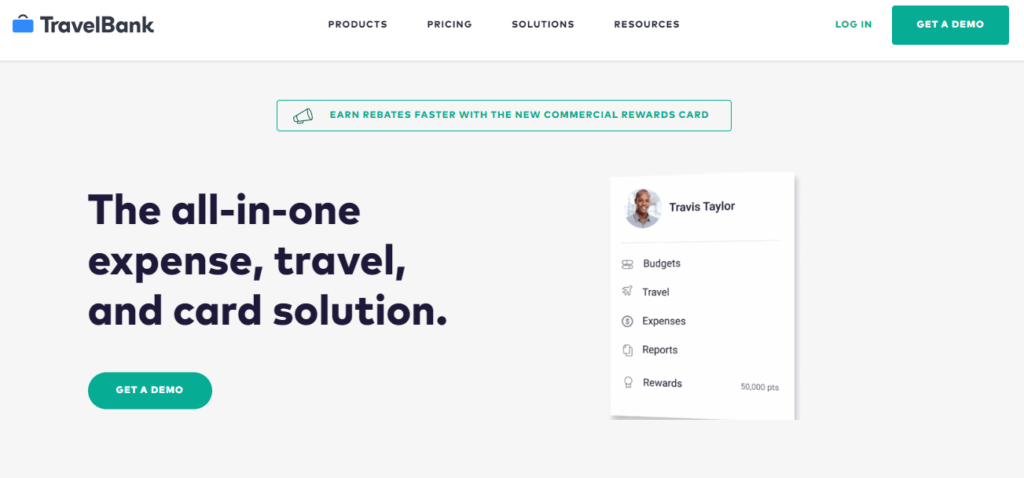
TravelBank stands tall as a frontrunner in the corporate travel management arena. Renowned for its user-friendly interface and innovative expense management tools, ensuring a seamless travel experience. Their emphasis on budget-friendly travel solutions, coupled with advanced analytics, empowers businesses to optimize their travel expenditure while enhancing overall productivity.
- All-in-one business travel & expenses
- Curated flight booking platform for employees to book flights at special corporate rates
- Employees can track and input expenses and management can review and approve expense reports.
- Employers can offer 24-hour reimbursements through TravelBank.
- Sync data through integrations with general ledger such as Quickbooks , NetSuite , Bill.com, and Xero .
G2 rating : 4.4/5 based on 329 reviews .
Capterra rating : 4.7 based on 210 reviews .
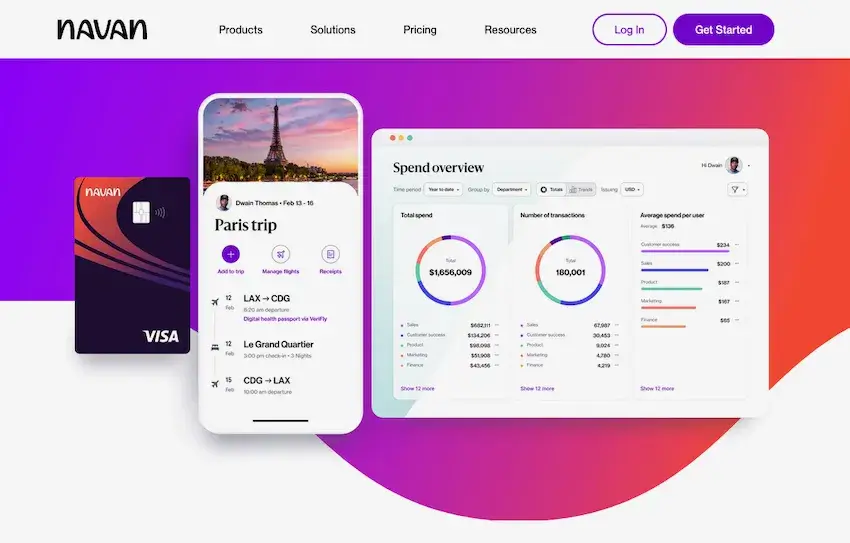
Navan takes pride in its personalized approach to corporate travel management. Their dedicated team of experts ensures swift problem resolution and provides 24/7 support, making them a reliable choice for businesses seeking a hands-on travel management partner.
- Connects Expense Features to Visa, Mastercard Corp. Cards
- Companies can monitor expenses and look for savings opportunities in a dashboard that shows pending and cleared transactions.
- Tools such as smart policy controls and auto-itemization to their current corporate cards
- Its AI technology offers valuable recommendations tailored to your company’s policies. It provides real-time insights into your travel expenses and delivers a complete travel management experience.
G2 rating : 4.7/5 based on 7,327 reviews .
Capterra rating : 4.7 based on 172 reviews .
4. AMEX GBT (American Express Global Business Travel)
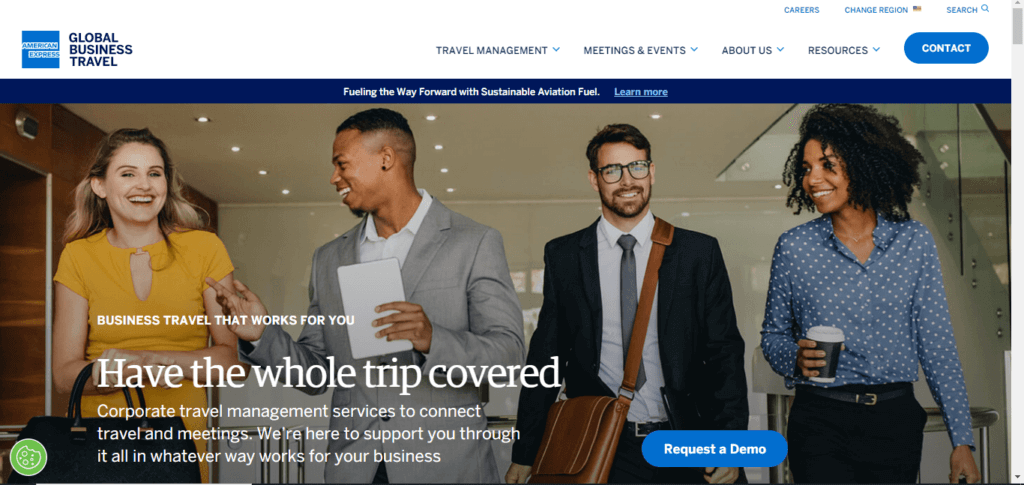
AMEX GBT stands as a global giant in the corporate travel landscape. Their extensive industry experience and worldwide presence make them a go-to choice for multinational corporations. They excel in offering end-to-end travel solutions, from booking to expense management, all while prioritizing traveller safety and satisfaction.
- Monitor rate drops and easily rebook tickets to save money with the re-shop tools.
- Allows you to stay up-to-date about recent events to inform your travel decision-making.
- Access to total refund amounts and any unused tickets available are visible in the easy-to-use reporting tool.
- Provides you with direct communication during disruptions.
G2 rating: 4.1/5 based on 8 reviews .
Capterra rating : no information.
5. SAP Concur
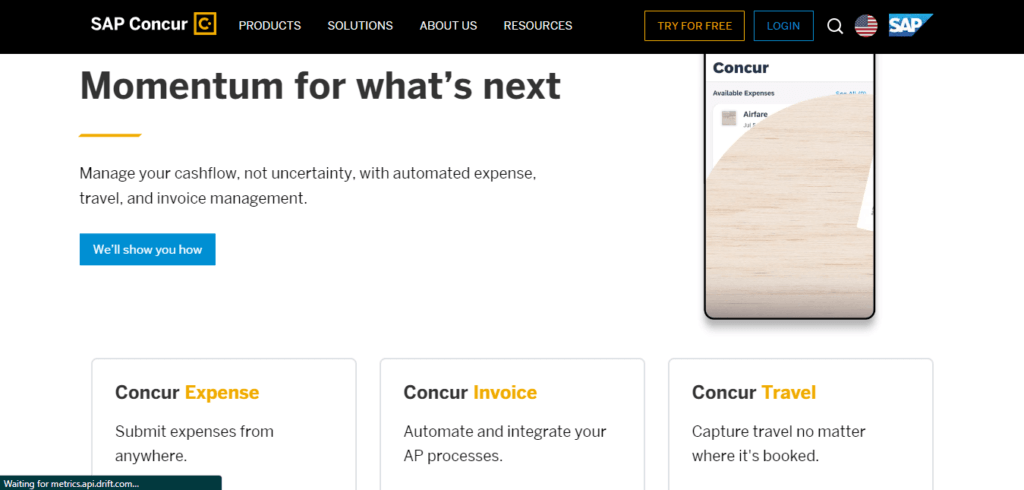
SAP Concur revolutionizes corporate travel management with cutting-edge technology. Their cloud-based platform integrates travel booking, expense reporting, and invoice management into a seamless workflow. Their emphasis on automation not only simplifies administrative tasks but also provides valuable insights through real-time data analytics, enabling businesses to make data-driven travel decisions.
- SAP Concur supports e-receipt import, allowing for easy digital documentation of expenses.
- It offers approval process control, ensuring that all expenses adhere to company policies and guidelines before being finalized.
- Multi-currency support enables seamless transactions and expense tracking in various international currencies.
- The platform facilitates efficient reimbursement management, streamlining the process for both employees and finance teams.
G2 rating : 4/5 based on 5957 reviews .
Capterra rating : 4.3/5 based on 1936 reviews .
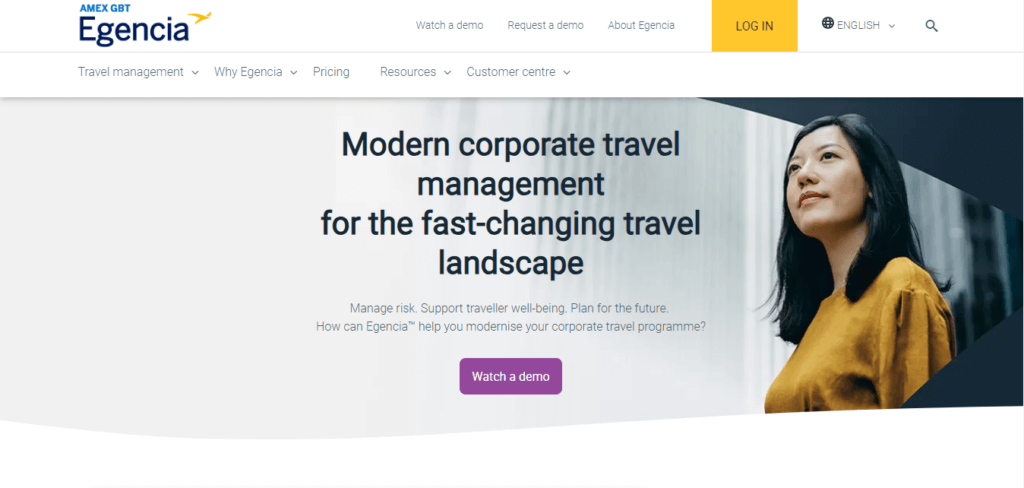
Egencia, an Expedia Group company, combines technology with a human touch to deliver exceptional corporate travel services. Known for their intuitive booking platform and personalized traveller experience, Egencia caters to businesses of all sizes. Their emphasis is on traveller satisfaction, combined with global supply partnerships, ensuring a smooth and enjoyable travel experience for employees.
- VAT recovery and reimbursement services to ensure businesses can reclaim eligible Value Added Tax, maximizing financial efficiency.
- Duty of care and risk management solutions to prioritize the safety and well-being of travellers, mitigating potential risks during their journeys.
- Inventory based on Expedia’s brands to ensure a high standard of choices for travellers.
G2 rating : 4.4/5 based on 655 reviews .
Capterra rating: 3.9/5 based on 50 reviews .
7. BCD Travel
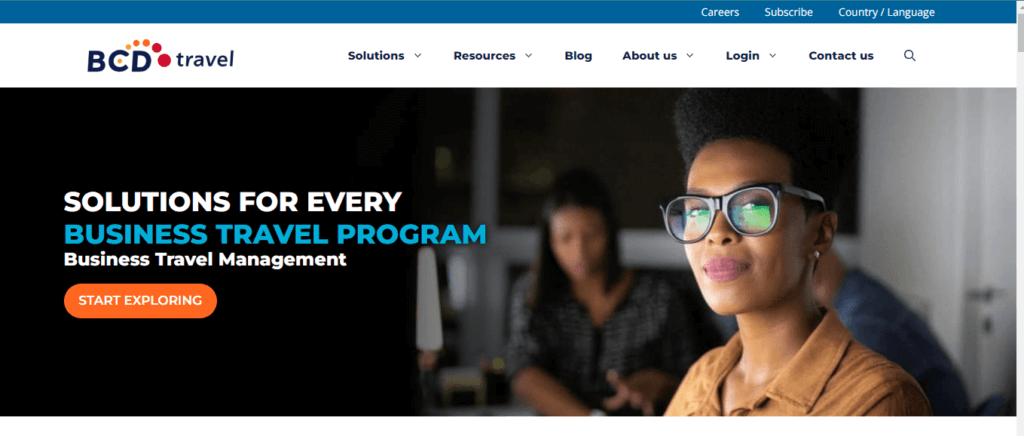
BCD Travel is a powerhouse in the corporate travel industry, offering a wide array of services to businesses worldwide. Their proactive approach to risk management, coupled with customized travel solutions, makes them a preferred choice for enterprises seeking comprehensive travel programs.
- BCD Travel has a suite of proprietary technology solutions to streamline the entire travel management process for their clients.
- Offers engineered and customized travel programs for those who have complex travel needs.
- Designed for companies with a big travel volume and have the need for tailor-made programs.
G2 rating: no information.
8. CWT (Carlson Wagonlit Travel)
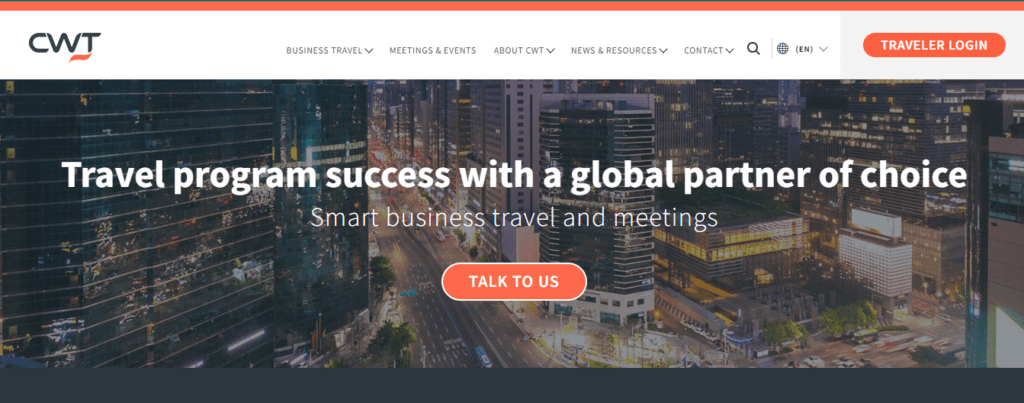
CWT stands out for its innovative travel solutions and unwavering commitment to client satisfaction. With a focus on data-driven insights, They optimise travel policies, enhance cost efficiency, and ensure traveller safety. Their robust mobile technology keeps travellers connected and informed, contributing to a hassle-free travel experience.
- Integrated hotel management and bookings: offers an integrated and streamlined hotel management and booking reservation experience.
- A mobile app to access itineraries, profiles, and supplier programs around the clock.
- Employee-wellbeing, climate impact, and organizational performance framework to align your sustainability and travel needs.
- Analytics and visualization capabilities to track your travel expenses with actionable insights.
G2 rating : 3.7/5 based on 7 reviews .
Capterra rating: no information.
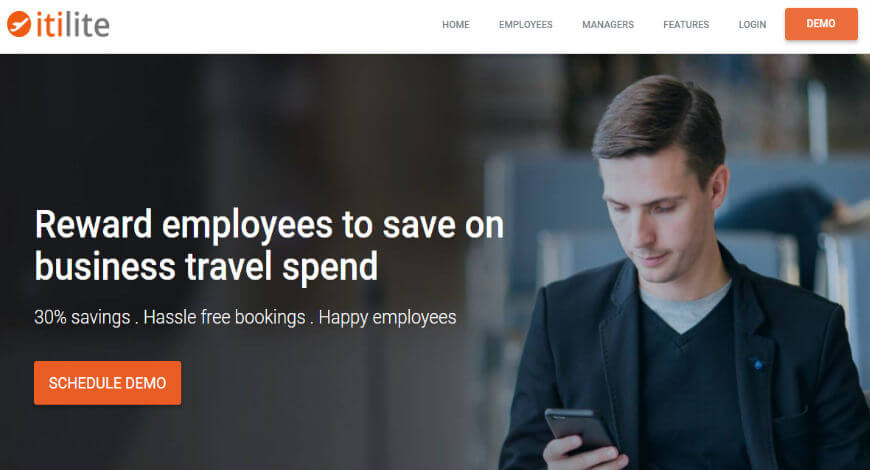
ITILITE is a leading global travel management company focused on efficient business travel. Their travel management software simplifies the booking process, policy compliance, and reporting through seamless automation. Allows travellers to book flights, hotels, and car rentals from a wide selection. The platform’s advanced features, like flight re-shopping and managing unused flight credits, lead to substantial cost savings of up to 30% on overall travel expenses.
- Businesses can configure policies in fine detail, allowing for precise control over travel guidelines, and ensuring compliance and budget adherence.
- The platform seamlessly integrates with third-party services, enabling businesses to connect and utilize additional tools and resources within the ITILITE environment.
- ITILITE’s flight re-shopping feature automatically re-evaluates flight options after booking, ensuring businesses get the best available rates, even after the initial reservation.
- Track travellers in real-time, enhancing safety and allowing for proactive responses in case of unexpected situations during travel.
G2 rating : 4.4/5 based on 530 reviews .
Capterra rating : 4.5/5 based on 84 reviews .
10. FCM Travel Solutions
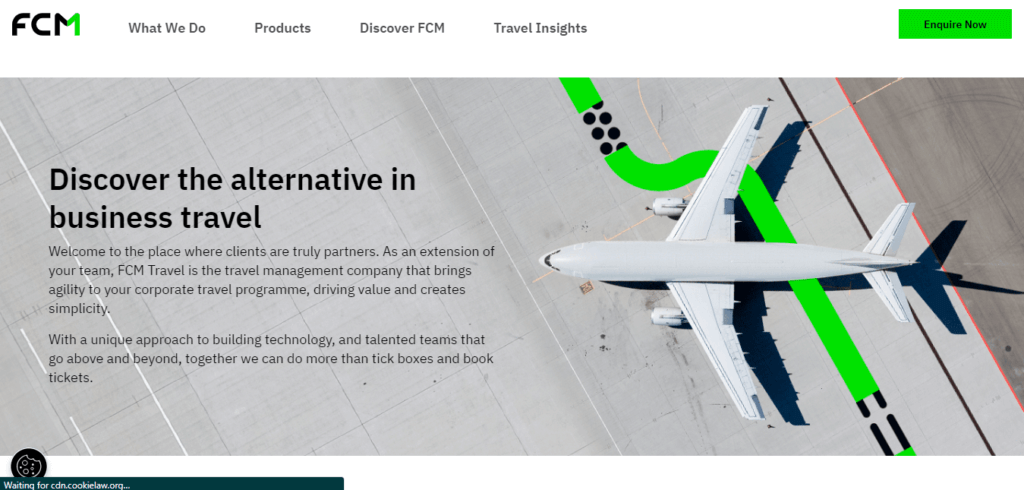
FCM Travel Solutions prides itself on its personalized service and global expertise. With a strong focus on travel policy compliance and cost optimization, they tailor their services to meet the unique needs of each client. Their dedicated travel managers provide expert guidance, ensuring seamless travel experiences for employees while maximizing savings for businesses.
- Offers efficient workflow management tools, streamlining the entire travel process from planning to reimbursement.
- Strict control over approval processes, ensuring that all company’s corporate travel and expenses policy best practices are being adhered to.
- Receipt Management: Simplifies receipt management, providing a user-friendly system for securely organizing and storing expense receipts.
G2 rating : 5/5 based on 1 review .
Capterra rating : no information
11. T.ravelPerk

TravelPerk stands out as one of the most renowned travel management companies, offering a diverse array of features and benefits tailored specifically to meet the travel needs of businesses. Provides access to a dedicated team committed to helping businesses reduce their travel-related carbon footprint. This is achieved through various carbon offsetting strategies, aligning with sustainable travel goals.
- Users have the option to seamlessly book flights, hotels, cars, and trains, all from a single platform.
- Easily set policy rules, including budget limits for each trip, ensuring compliance with company guidelines.
- Allows cancellations with a remarkable refund policy, offering up to 80% of the booking cost back for cancellations made up to 2 hours before the scheduled travel.
G2 rating : 4.6/5 based on 1507 reviews .
Capterra rating : 4.8/5 based on 398 reviews .
Tips for Optimizing Corporate Travel
Corporate travel, when executed efficiently, can become a strategic asset for any business. Here are 5 tips to ensure that:
1. Develop a Clear Travel Policy
- Establish a comprehensive travel policy outlining guidelines for bookings, accommodation, expenses, and safety protocols.
- Ensure all employees are familiar with the policy, emphasizing compliance to control costs and maintain consistency.
2. Embrace Technology
- Utilize advanced travel management platforms and mobile apps for seamless travel and accommodation bookings , real-time updates, and digital expense tracking.
- Integrate travel software with your company’s systems to streamline approval processes and minimize administrative hassles.
4. Optimize Booking Strategies:
- Encourage early bookings to secure the best rates for flights, hotels, and transportation.
- Leverage data analytics to identify booking patterns and negotiate bulk deals with preferred vendors for additional cost savings.
5. Encourage Policy Compliance
- Educate employees about the financial implications of policy violations and incentivize adherence.
- Implement regular audits to ensure compliance, providing feedback and additional training when necessary.
In the realm of modern business, where global connections and swift interactions are paramount, the art of corporate travel management stands as a linchpin, connecting aspirations with achievements.
Our exploration of the top 10 corporate travel management companies showcasing their dedication to providing exceptional services tailored to meet the unique needs of businesses.
Ready to transform your travel experience? Whether you’re planning your next business trip or a relaxing getaway, let us simplify your accommodation needs . Explore our curated selection of comfortable and convenient stays tailored just for you.
Read more Business Travel articles
International women’s day 2024: how business travel can inspire inclusion.

First Business Travel: 8 Essential Tips for a Successful Trip

What is a Travel Management Company? TMC Explained

Renting a Car for Business Travel: Tips and Benefits
- English (CA)
- Deutsch (DE)
- Deutsch (CH)
5 best corporate travel management apps
1. travelperk.
?)
- Platforms supported : iOS, Android
- Languages supported : English, French, German, Spanish, Italian
- Premium : $99/month + 3% booking fee
- Pro : $299/month + 3% booking fee
- Enterprise : Custom
?)
See how to save money on business travel
?)
- Languages supported : English, Danish, Dutch, Estonian, Finnish, French, German, Irish, Portuguese, Spanish, Swedish
- Essential : €45/month or €39/month if billed yearly
- Advanced : €99/month or €89/month if billed yearly
?)
- Languages supported : German, English, French, Italian, Chinese (Simplified)
- Pricing : Yokoy offers custom pricing based on each business’ unique requirements. The pricing model is based on the number of users, and is charged on a per-user/month basis. The smallest package is 50 users/month, plus a one-time set-up fee and implementation costs.
4. Travel Ibex
?)
- Platforms supported : Travel Ibex is an online app that can be accessed on Wi-Fi or data via smartphone without any installation.
- Languages supported : English, Spanish
- Light: $39/month per user
- Standard: $89/month per user
- Premium: $119/month per user
?)
- Languages supported : English, German
- Pricing : Roomex offers a free version for manual corporate travel booking, and a travel management solution for a fee starting at 3% per booking.
?)
Make business travel simpler. Forever.
- See our platform in action . Trusted by thousands of companies worldwide, TravelPerk makes business travel simpler to manage with more flexibility, full control of spending with easy reporting, and options to offset your carbon footprint.
- Find hundreds of resources on all things business travel, from tips on traveling more sustainably, to advice on setting up a business travel policy, and managing your expenses. Our latest e-books and blog posts have you covered.
- Never miss another update. Stay in touch with us on social for the latest product releases, upcoming events, and articles fresh off the press.
?)
The 8 best business travel management companies in Europe
?)
10 best business travel management companies in Ireland
?)
8 best business travel management companies in Dubai
- Business Travel Management
- Offset Carbon Footprint
- Flexible travel
- Travelperk Sustainability Policy
- Corporate Travel Resources
- Corporate Travel Glossary
- For Travel Managers
- For Finance Teams
- For Travelers
- Thoughts from TravelPerk
- Careers Hiring
- User Reviews
- Integrations
- Privacy Center
- Help Center
- Privacy Policy
- Cookies Policy
- Modern Slavery Act | Statement
- Supplier Code of Conduct

IMAGES
VIDEO
COMMENTS
Corporate travel management is responsible for keeping costs in check, as travel prices are notoriously variable. Optimizing pricing can have a measurable impact on maintaining budgets and help companies fund more business trips without significantly expanding the budget. Corporate travel management can set guidelines for how much employees can ...
Corporate travel management (CTM) is an important way that companies large and small can attempt to control and cut down on their travel costs. Corporate travel management (CTM) is an important ...
Importance of Corporate Business Travel . ... A Complete Guide to Corporate Travel Management. Jan 11, 2024. Are Travel Rewards Credit Cards Worth It? Updated Apr 10, 2024.
Core Elements of Corporate Travel Management. The core elements of corporate travel management revolve around processes and policies designed to streamline and oversee all aspects of business travel. These elements ensure that travel is cost-effective, efficient, and aligned with the company's objectives and policies.
Corporate travel management (CTM) is the framework that companies administer to successfully handle business trips and travel and entertainment (T&E) expenditures. CTM programs oversee, organize, and manage business travel end to end, including activities such as approving and booking flights and hotels, managing business credit card spending ...
It seems that, finally, the light at the end of the pandemic tunnel is in sight—at least in some parts of the world. In 2020, total global business travel expenses contracted by 52 percent, while managed corporate-travel spending in the United States plummeted 71 percent, or $94 billion. Last year, when we reported on the impact of COVID-19 ...
Corporate travel management (CTM) programs help to minimize the time-consuming aspects of business travel, like bookings and reporting paperwork, along with some of the other pain points of business travel. An effective CTM program can help organizations implement company travel policies, booking, track T&E expenditures, and successfully ...
Corporate travel management is the process of coordinating, analyzing, and managing a company's business travel needs. Effective corporate travel management is crucial for keeping business trips organized and efficient, ensuring that travel arrangements align with the company's policies, helping to enhance the safety and comfort of travelers, and adhering to budgets.
Business travel is important to your organization's business interests. It gives your company a chance to make a face-to-face impact with customers and partners worldwide. As someone dealing with business travel management, you work at the forefront of a rapidly expanding, trillion-dollar industry. That comes with a lot of responsibility and an ...
In corporate travel, company policies and procedures are created to reduce costs and streamline the business process for a more efficient, effective, and streamlined operation. Let's take a look at how to establish an efficient corporate travel management system for your company. Challenges in Corporate Travel Management
Corporate travel management is a company's structure to facilitate business travel, plan a business trip or organize a corporate event.
Under the umbrella of corporate travel management is everything related to the management of business-related trips. And there's plenty to consider: Building and maintaining travel policies (they should be sustainable travel policies, too). Ensuring compliance with your policies. Setting travel budgets and tracking spending.
If your company has negotiated hotel rates, you want your corporate solution to be able to book those rates for you, so you don't lose the travel data by booking directly. 5. Improve collaboration between admin and finance. The most important thing in modern travel management is that it serves the whole entire company.
Therefore, corporate travel planning has become all the more important. Efficient travel management provides a great experience to their employees and gets a good ROI for their efforts. Additionally, a sound business travel policy can address all functions associated with supporting corporate travel. It takes into account the needs and ...
Key benefits of corporate travel for employees. Helps in professional development of the employee. Assist in relationship building and networking. Travel results in skill enhancement of the employee. Increased job satisfaction and ensures work life balance. Helps in cultural richness and expose to new markets.
7 Benefits of Using a Corporate Travel Management Company are: Access to a Dedicated Support Team. Cost Saving Strategies. Assistance with Risk Management. Access to Technology and Tools. Enhanced Reporting. Travel Policy Creation and Integration. Time Savings for Travel Managers and Traveler.
Risk Management. Corporate travel management extends beyond cost considerations. It also encompasses the critical aspect of traveler safety. Travel management companies provide tools and resources to assess and mitigate travel risks. These tools may include monitoring travel advisories, offering safety information, and assisting during emergencies.
The importance of corporate travel management. Business travel is not just about employees traveling around the world; it is a strategic tool that promotes business growth, customer loyalty and collaboration. Effective business travel management is critical for optimizing expenses, increasing employee productivity and ensuring compliance with ...
Introduction Today's global business environment makes travel crucial to a company's success. Corporate travel is a crucial part of conducting business, whether attending conferences, visiting clients, or researching new markets. However, travel costs can easily get out of hand without careful management, burdening resources and lowering productivity. This article discusses the value of ...
Efficient corporate travel management involves streamlining the booking process to save time and ensure policy compliance. Velocity.Travel provides user-friendly online booking platforms and automated reporting tools, allowing employees to easily book flights, hotels, and other accommodations while adhering to the company's travel policies.
In essence, the growing importance of corporate travel management can be attributed to its role in costly management errors, enhancing efficiency, controlling costs, ensuring safety, and simplifying the intricate web of global travel. Criteria for Selecting the Top 10 Corporate Travel Management Companies.
Business travel services are crucial for time and efficiency. The TMCs are experts in managing various aspects of business travel, including booking flights, hotels, rental cars, and other concierge services. By leveraging these services, you can easily manage other aspects of corporate travel, such as visa applications, travel insurance ...
Corporate travel has seen an enormous resurgence following the COVID-19 travel downturn in 2020. In 2022, Americans took an astonishing 371 million business trips, and that number is expected to increase substantially in the coming years.We are more globalized than ever, and often, your businesses' needs require employees to travel domestically or internationally to conferences, meet-ups ...
Travel Management: The Key to Efficient Corporate Travel Travel management encompasses a range of processes and activities designed to optimize and streamline corporate travel. It involves planning, booking, tracking, and managing various aspects of business travel to ensure that the journey is cost-effective and productive.
5. Roomex. Best for employee travel management and expense tracking. Roomex is a travel and spend management platform that brings control and visibility to travel spend by helping travelers book, manage, pay, and analyze all their accommodation and travel expenses in one place. Using the Roomex business travel management app, travelers can view ...